Texas Documents
Quitclaim Deed
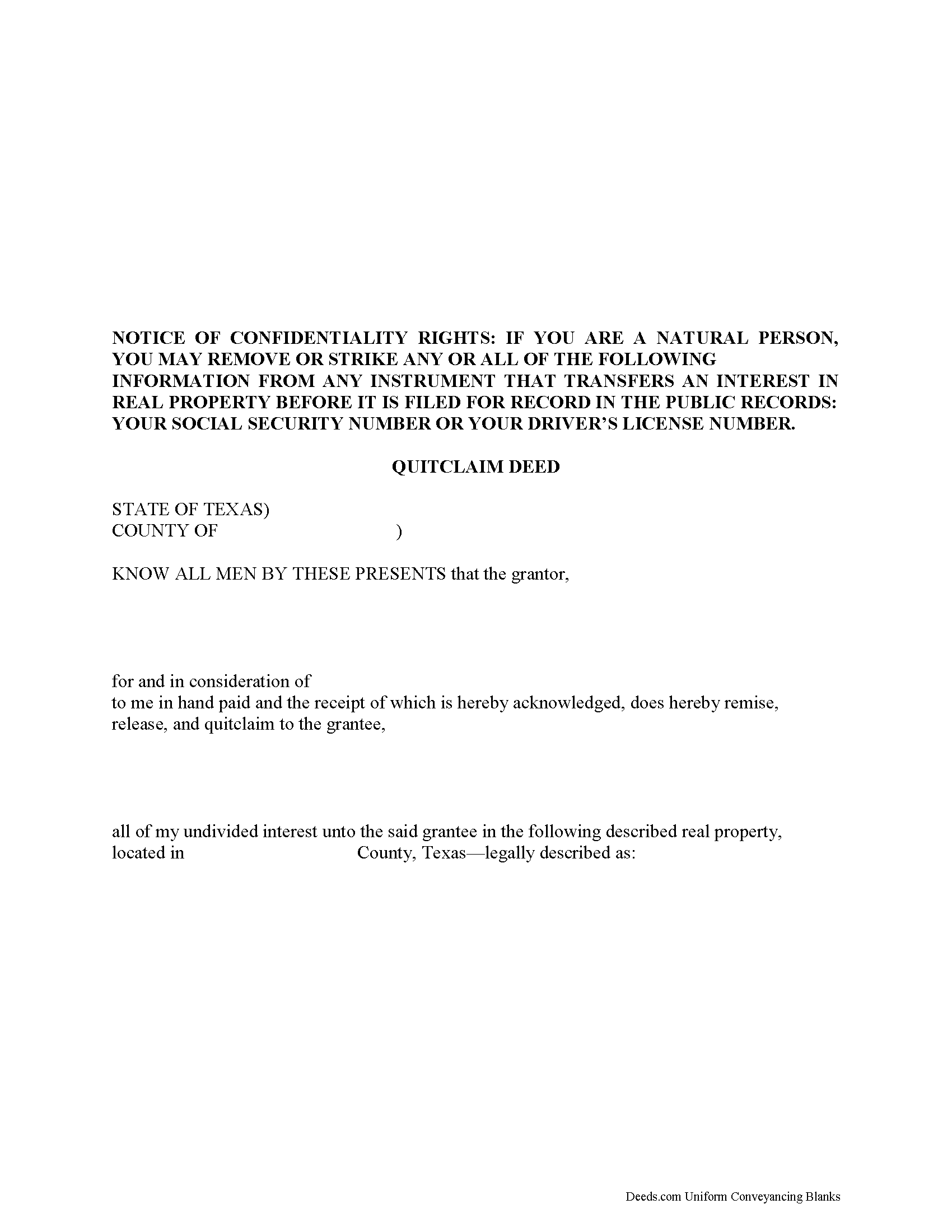
A quitclaim deed in Texas is recordable once it has been acknowledged, sworn to with a proper jurat, or proved according to law. The grantor to the quitclaim deed must sign and acknowledge the instrument. If the grantee's address is not included in the deed, the recording party may face penalty fees. There may also be formatting standards and specific guidelines as to the type of information that should be included in a quitclaim deed presented for recording in Texas.
An unrecorded quitclaim deed is binding only to the parties involved, the party's heirs, and a subsequent purchaser who does not pay a valuable consideration or who has notice of the instrument (Tex. Prop. Code Ann. 13.001 b). The recording act in Texas states that any conveyance or interest in real property (i.e. a quitclaim deed) is void against creditors and subsequent purchasers for valuable consideration without notice unless the instrument has been acknowledged, sworn to, or proved and filed for record according to law. A quitclaim deed that is properly recorded in the proper county in Texas will provide notice to the public of the existence of the instrument and will also be subject to public inspection (T... More Information about the Texas Quitclaim Deed
Gift Deed

Gifting Real Property in Texas
Gift deeds transfer title to real property from one party to another with no exchange of consideration, monetary or otherwise. Often used to transfer property between family members or to transfer property as a charitable act or donation, these transfers occur during the grantor's lifetime. It is important that a gift deed contain language that explicitly states that no consideration is expected or required. Ambiguous language, or references to any type of consideration, can make the gift deed contestable in court.
A lawful gift deed includes the grantor's full name and marital status, as well as the grantee's full name, marital status, vesting, and mailing address. Vesting describes how the grantee holds title to the property. Generally, real property is owned in either sole ownership or in co-ownership. For Texas residential property, the primary methods for holding title in co-ownership are tenancy in common, joint tenancy, and community property (TEX. EST CODE 111.001, TEX. FAM CODE 3.003).
As with any conveyance of realty, a gift deed requires a complete legal description of the parcel. Recite the source of title to establish a clear c... More Information about the Texas Gift Deed
Warranty Deed
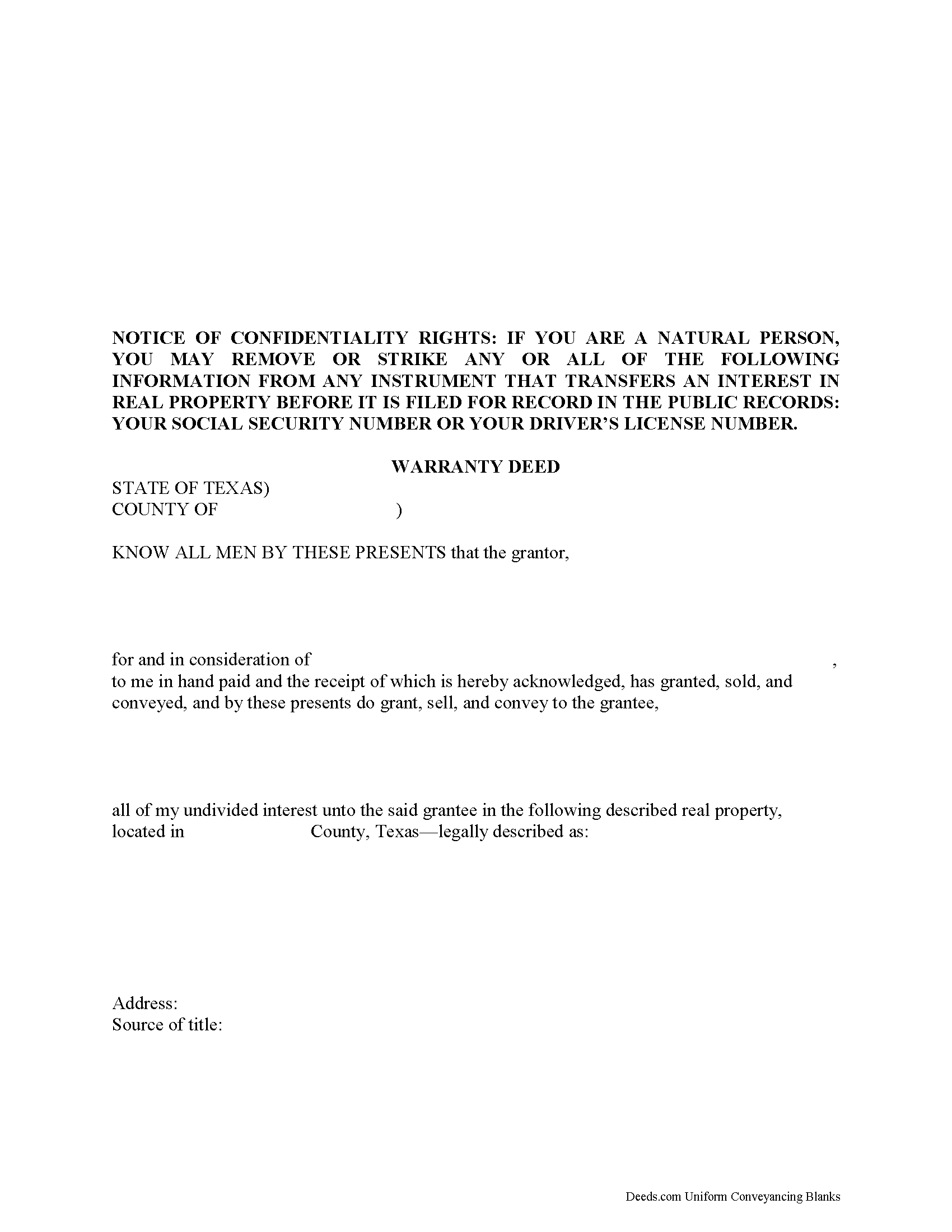
A general warranty deed in Texas contains both express and implied warranties. The Texas statutory form for a conveyance of real property, provided in Sec. 5.022 of the Texas Statutes, will convey a fee simple estate in real property with a covenant of general warranty. A covenant of general warranty binds the grantor to warrant and forever defend the property being conveyed to the grantee against every person lawfully claiming or to claim the same against the property, or any part thereof. The parties to a conveyance may insert any clause or use any form for a warranty deed not in contravention of law (Sec. 5.022). Unless a warranty deed provides otherwise, the use of the words "grant" or "convey" implies only that the grantor and the grantor's heirs covenant to the grantee and the grantee's heirs or assigns (1) That previous to the execution of the conveyance, the grantor has not conveyed the estate or any interest in the estate to any person other than the grantee and (2) that at the time of execution of the conveyance, the estate was free from encumbrances (Sec. 5.023). A general warranty deed is a commonly used real estate deed in Texas.
To be effectively recorded by a cou... More Information about the Texas Warranty Deed
Special Warranty Deed
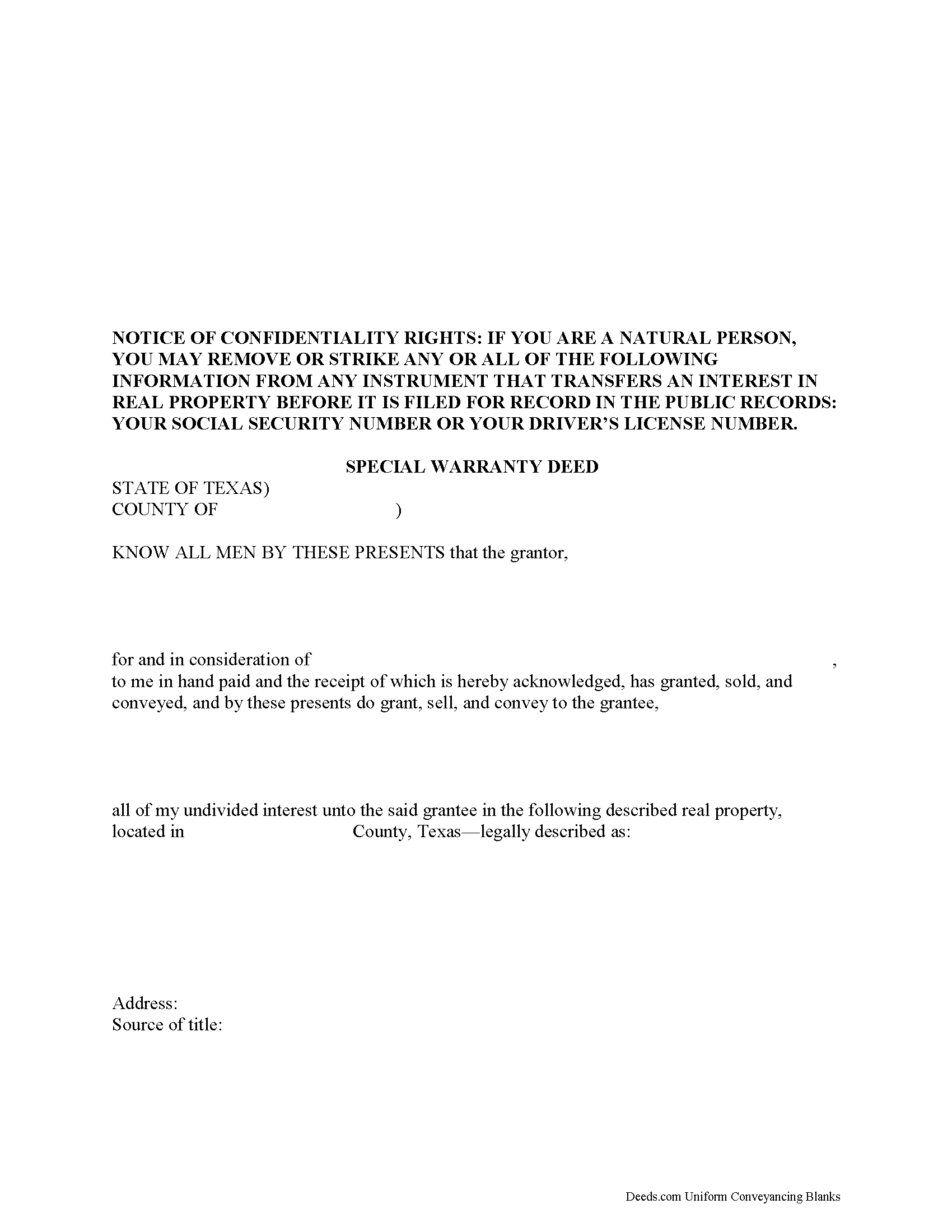
A special warranty deed can be used in Texas to convey title to real property. Special warranty deeds in this state will contain both express and implied warranties. A special warranty deed in Texas only warrants against defects, liens, and encumbrances arising by, through, or under the grantor. Even if a conveyance does not have express covenants of warranty, the words "grant" and "convey" will imply only the following covenants from the grantor: (a) That prior to the execution of the conveyance, the grantor has not conveyed the estate or any interest in the estate to any person other than the grantee and (b) that at the time of execution of the conveyance, the estate is free from any encumbrances (5.023).
A real property instrument, such as a special warranty deed can be recorded if it has been acknowledged, sworn to with a proper jurat, or proved according to law (12.001). Original signatures are required. The failure of a notary public to attach an official seal to an acknowledgment or other proof taken in a state other than Texas will render the acknowledgment invalid only if the jurisdiction in which the acknowledgement is taken requires the notary public to attach a seal... More Information about the Texas Special Warranty Deed
Grant Deed
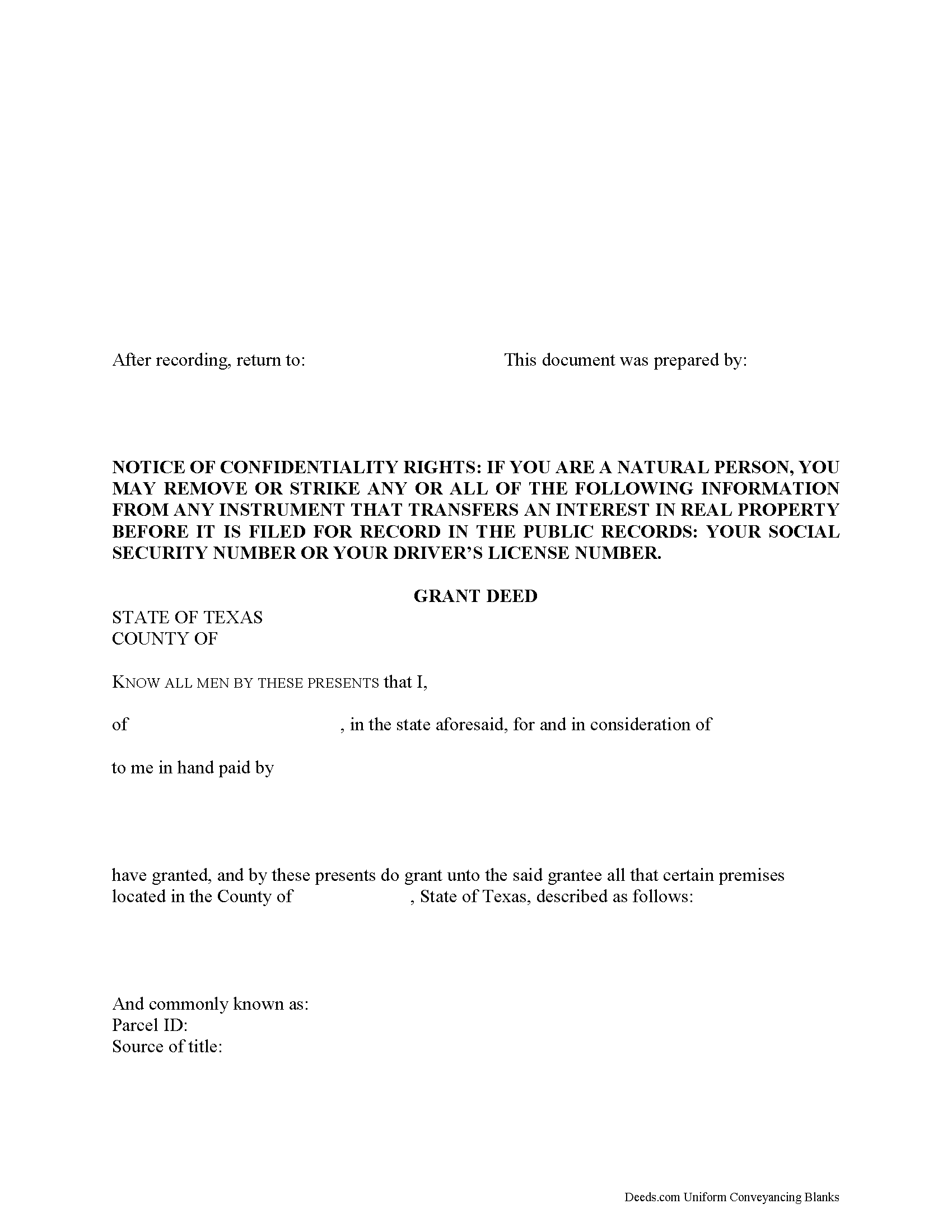
In Texas, a grant deed conveys title to real property with implied covenants. By including the words "grant" or "convey," the grantor guarantees that he/she has not transferred title to the property to anyone other than the grantee, and that, at the time of transfer, the estate is free from impediments. Implied covenants carry the same legal implications as if they were explicitly stated (TEX. PROP CODE 5.023).
The document must state the grantor's full name and marital status, the consideration given for the transfer, and the grantee's full name, marital status, vesting information, and mailing address. Include a complete legal description of the parcel, and recite the source of title to maintain a clear chain of title, detailing any restrictions associated with the property. The document must be signed and acknowledged by the grantor in the presence of two credible witnesses or a certified officer (TEX. PROP CODE 12.001b).
Depending on the nature of the transaction, the deed might also require supporting and/or supplemental documentation. Record the completed deed, along with any additional materials, in the clerk's office of the county where the property is located.
... More Information about the Texas Grant Deed
Correction Deed
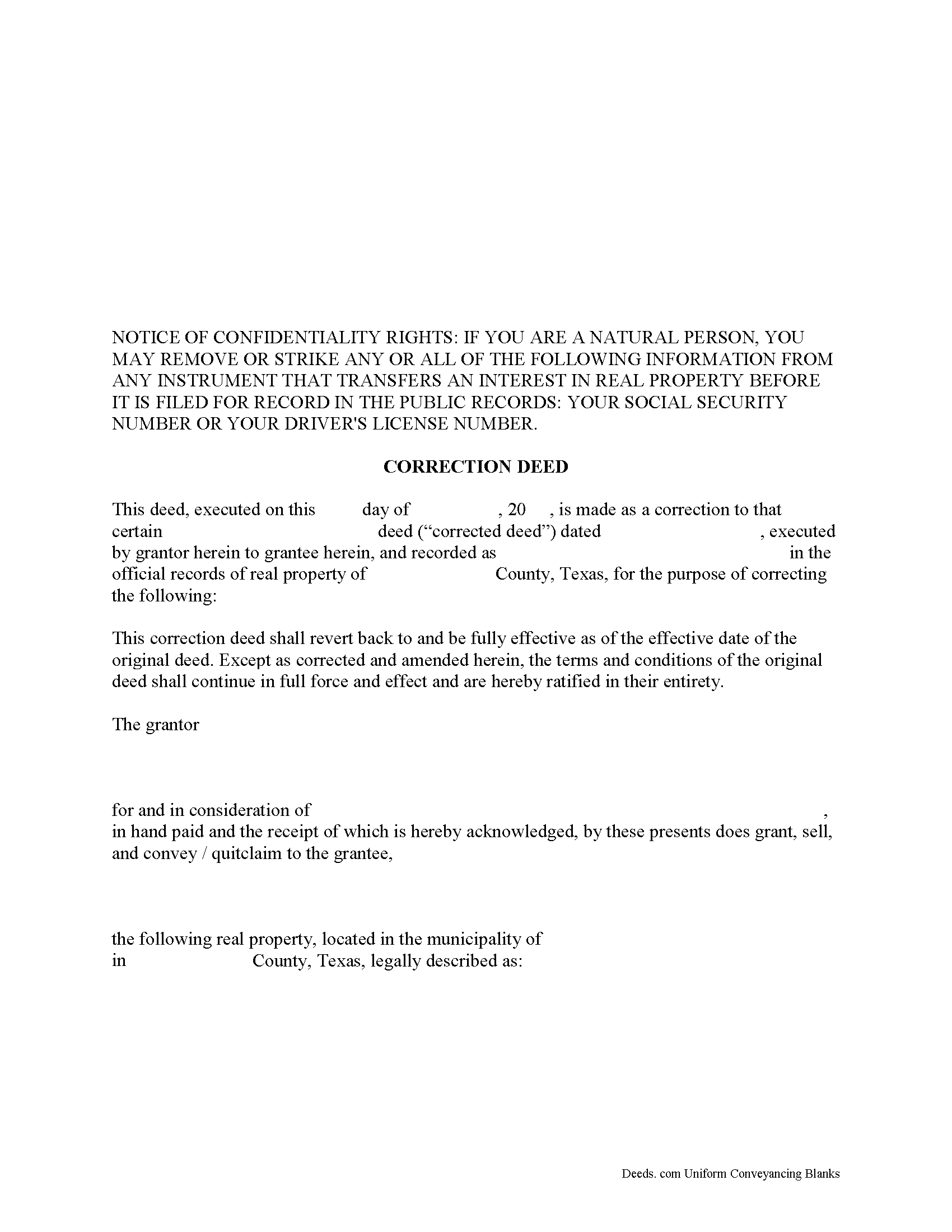
In Texas, a correction deed is the deed issued to make changes to an erroneous deed, referred to as the corrected deed. These two instruments are closely linked, and all corrections are effective as of the date of the original recorded instrument (Property Code Sec. 5.030).
Texas Property Code distinguishes between material and non-material corrections, giving specific examples in each category. Non-material changes are generally clerical in nature and include additions to or corrections of: party names and marital status; elements of the property description, such as, an error in a metes and bounds description or incorrect acreage; the recording date or reference data to an earlier instrument; a missing or defective acknowledgement. All these corrections can be made by persons other than the parties of the original instrument, as long as reasons for the correction and knowledge of the facts corrected are stated and evidence of notification of the original parties or their heirs is provided (Property Code Sec. 5.028).
Material corrections, on the other hand, can only be made by the original parties or their heirs and must be executed by all of parties involved. Such changes i... More Information about the Texas Correction Deed
Transfer on Death Deed
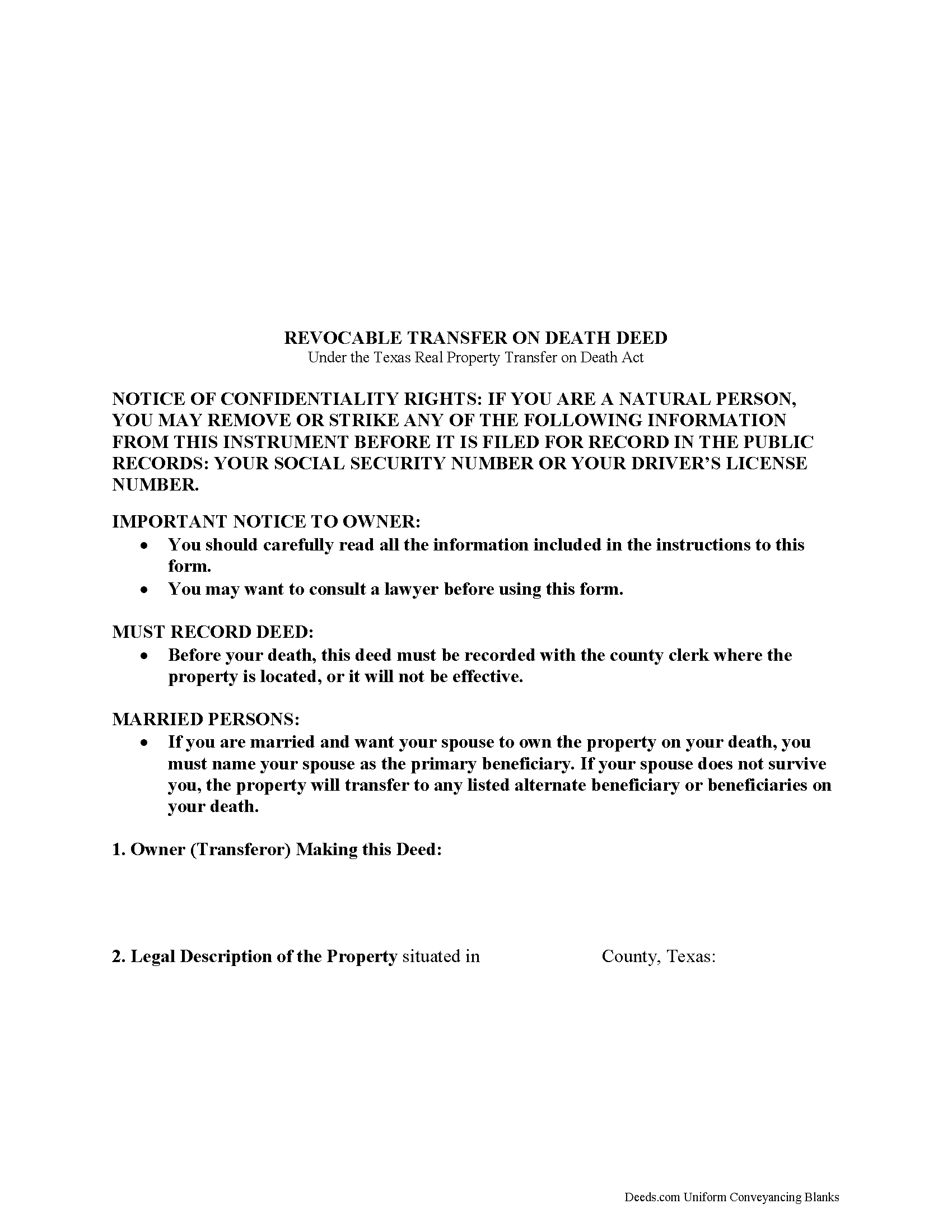
On September 1, 2015, owners of real property in Texas gained access to a useful estate planning tool: the statutory transfer on death deed (TODD). Modeled after the Uniform Real Property Transfer on Death Act and located at Chapter 14 of the Texas Estates Code, the Texas Real Property Transfer on Death Act governs the use of transfer on death deeds in the State of Texas.
IMPORTANT: TRANSFER ON DEATH DEEDS AND ASSOCIATED REVOCATIONS MUST BE RECORDED WHILE THE OWNER IS ALIVE OR THEY HAVE NO EFFECT.
Requiring the same level of competency as needed for a contract ( 114.054), transfer on death deeds are nontestamentary (not using a will) instruments. They allow transferors/owners to retain absolute ownership of and control over their land during their lives -- they may sell, mortgage, rent, or otherwise use the real estate as they desire, with no penalty for waste or obligation to notify the beneficiaries ( 114.101).
To be lawfully executed, a TODD must fulfill three minimum standards, set out in 114.055:
* Meet all state and local standards for recordable deeds, including appropriate content and format
* State that the transfer will take place at the owner's death
... More Information about the Texas Transfer on Death Deed
Transfer on Death Revocation
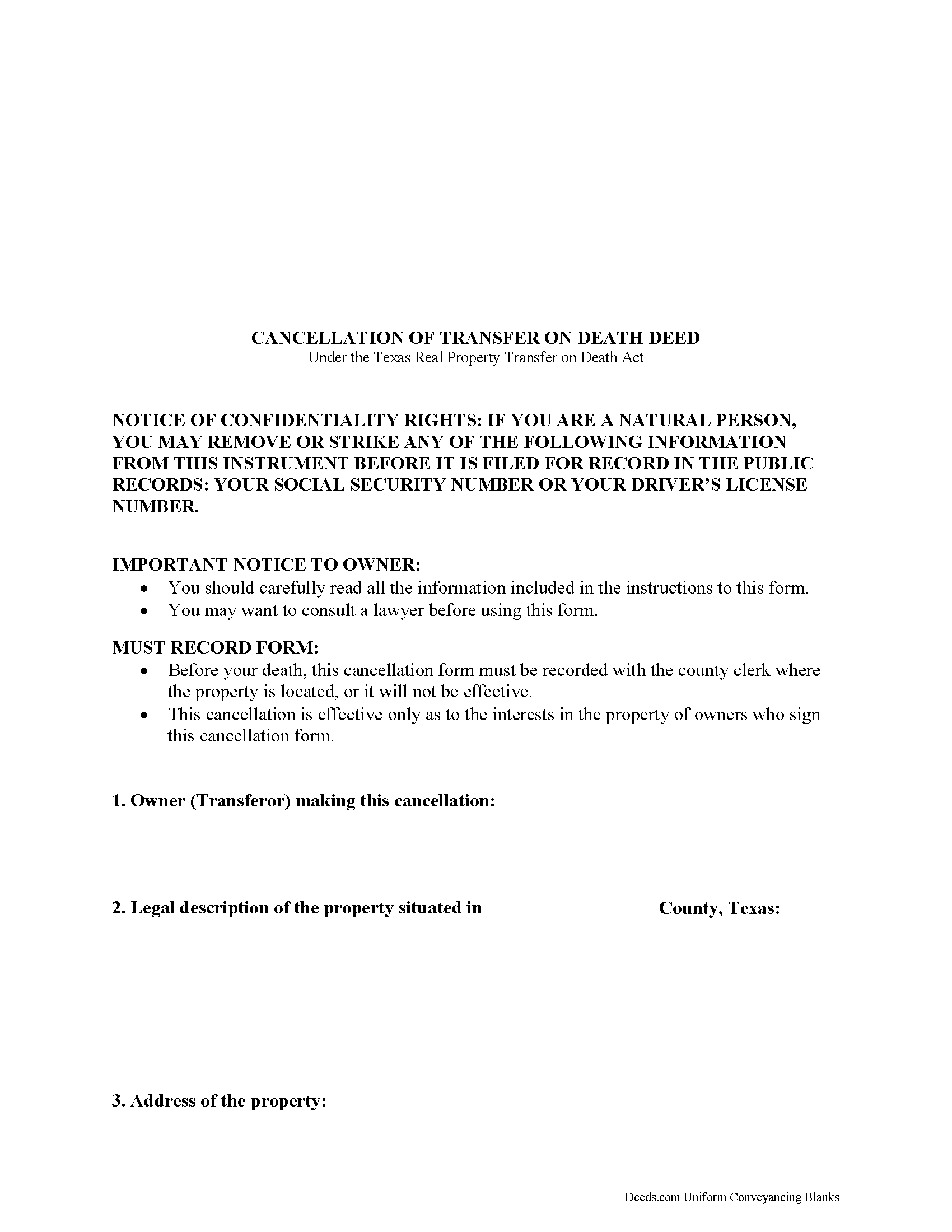
Revoking Transfer on Death Deeds in Texas
On September 1, 2015, owners of real property in Texas gained access to a useful estate planning tool: the statutory transfer on death deed (TODD). Modeled after the Uniform Real Property Transfer on Death Act and located at Chapter 14 of the Texas Estates Code, the Texas Real Property Transfer on Death Act governs the use of transfer on death deeds in the State of Texas.
IMPORTANT: TRANSFER ON DEATH DEEDS AND ASSOCIATED REVOCATIONS MUST BE RECORDED WHILE THE OWNER IS ALIVE OR THEY HAVE NO EFFECT.
Transfer on death deeds are nontestamentary instruments (not using a will). They allow transferors/owners to retain absolute ownership of and control over their land during their lives -- they may sell, mortgage, rent, or otherwise use the real estate as they desire, with no penalty for waste or obligation to notify the beneficiaries (114.101).
By recording the executed TODD, property owners may also take advantage of one of the most unique aspects of these instruments: revocability (114.052). Revocability is possible for two primary reasons: there is no obligation to notify the beneficiaries about the potential future interest they... More Information about the Texas Transfer on Death Revocation
Enhanced Life Estate Deed
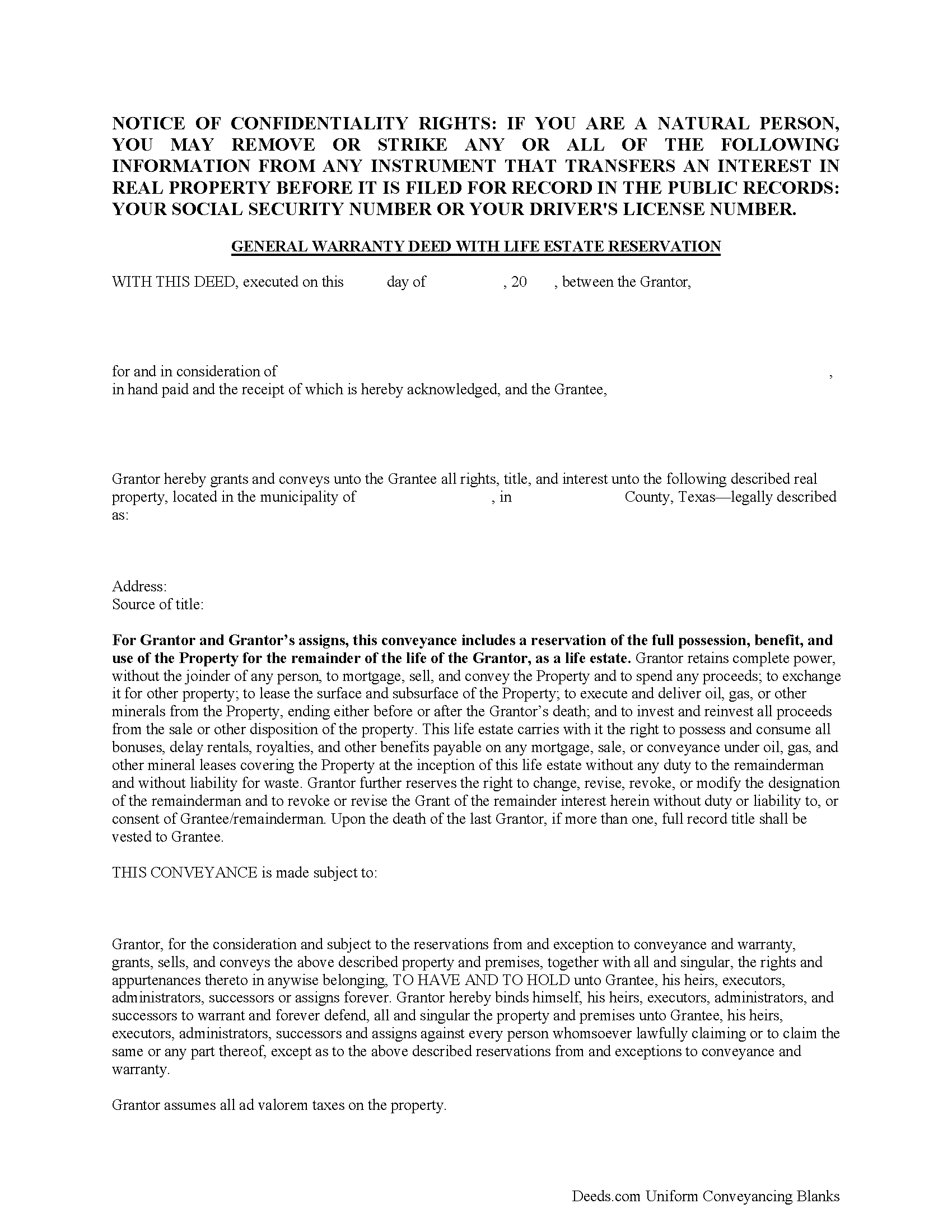
A Lady Bird deed, also called an enhanced life estate deed or reservation of a life estate with a general power of appointment, is a useful estate planning tool. When executed, the grantor conveys a life estate in real property to himself, with the remainder conveyed to the beneficiary of his choice, thereby avoiding the probate process. This type of deed enables the grantor to preserve homestead status (if claimed) as well as any deductions, protections, and tax exemptions associated with the real estate during his lifetime. In addition, he retains absolute control over the property, allowing for the option to change the beneficiary or even sell, convey, or mortgage the property before the transfer of ownership goes into effect upon the grantor's death.
(Texas Enhanced Life Estate Package includes form, guidelines, and completed example)... More Information about the Texas Enhanced Life Estate Deed
Easement Deed
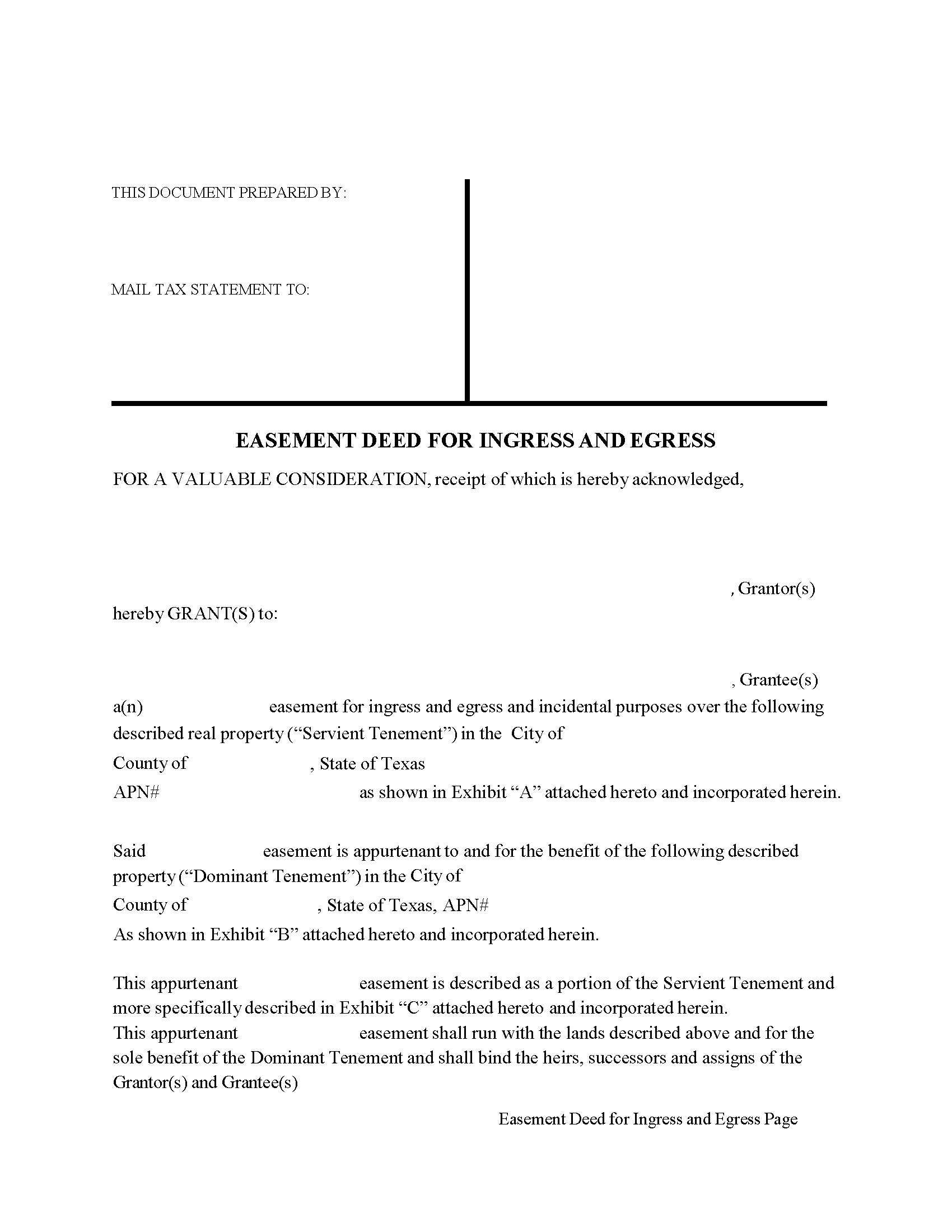
An easement is the non-possessory right to use another person's real property for a specific purpose. Easements exist distinct from the ownership of the land and do not constitute full ownership of the property in question. Easements can be both private and public. Private easements are those in which the enjoyment or use is restricted to one or a few individuals, while public easements are those in which the right or enjoyment of use is vested in the public generally or a community. Private easements are either appurtenant or in gross. Section 23.006 of the Texas Statutes discusses access easements in relation to partitioned property. The rights contained in an easement are created by an easement deed.
Because an easement represents an interest in land, it is required to be in writing, subscribed by the grantor, and delivered (Sec. 5.021). In order to be recorded, an easement deed must be signed by the grantor and properly acknowledged, sworn to with a jurat, or proved according to law (Sec. 12.001a). Original signatures are required. An easement deed may be refused for recording unless it has been signed and acknowledged or sworn to by the grantor in the presence of two or m... More Information about the Texas Easement Deed
Termination of Easement
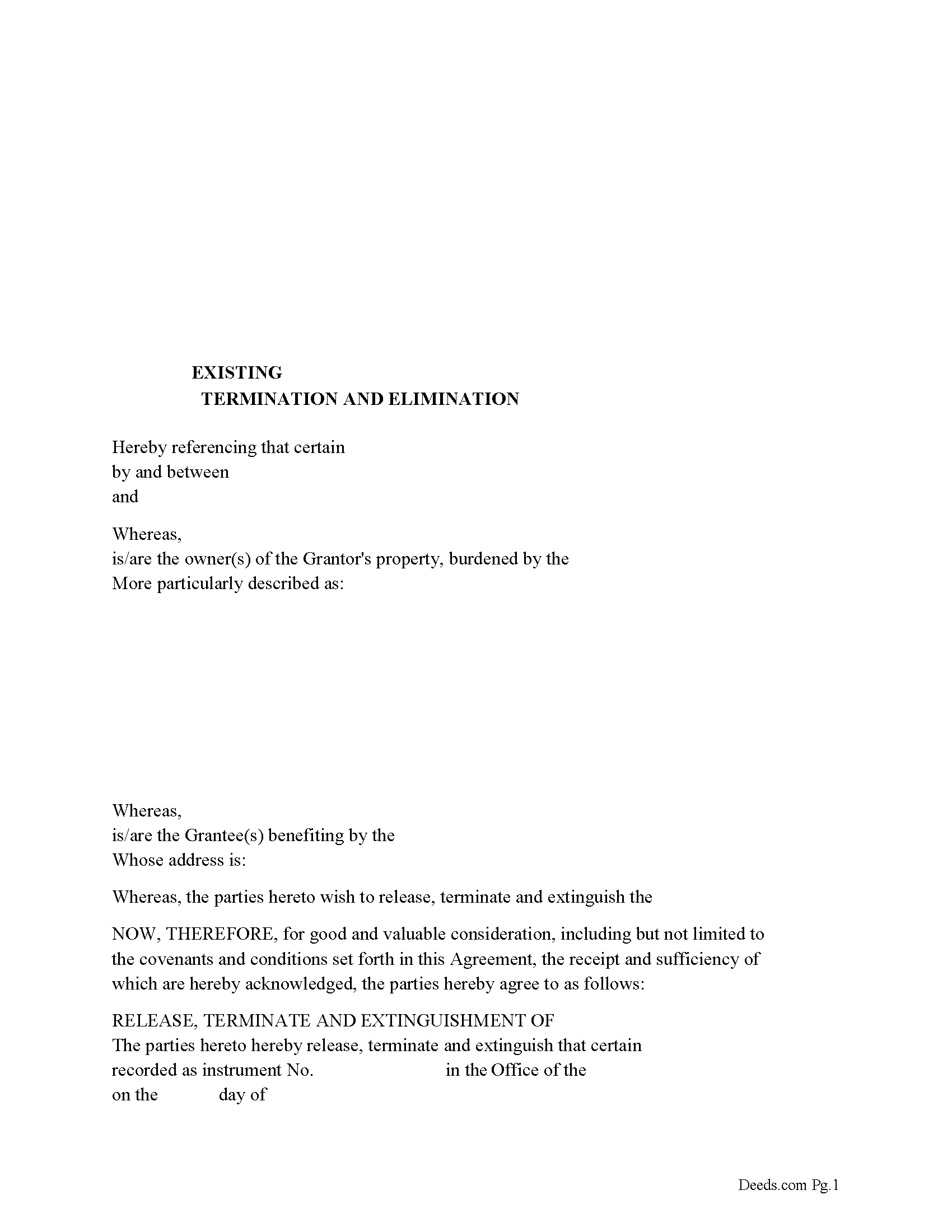
Use this form to release, terminate, extinguish a previously recorded document that involves access to and from a property.
Documents such as:
1. Easement Deeds or Agreements (An easement is a non-possessory interest in land, granting the right to use someone else's property for a specific purpose, like a driveway or utility line)
2. Access Roads
3. Right of Ways
4. Utility Easements (Power, Gas, Water, Sewer, Etc.)
5. Drainage Easements
This document allows the owner of the land, burdened by the access and the party that benefits from the access, to sign an agreement releasing the property from such access, ... More Information about the Texas Termination of Easement
Executor Deed
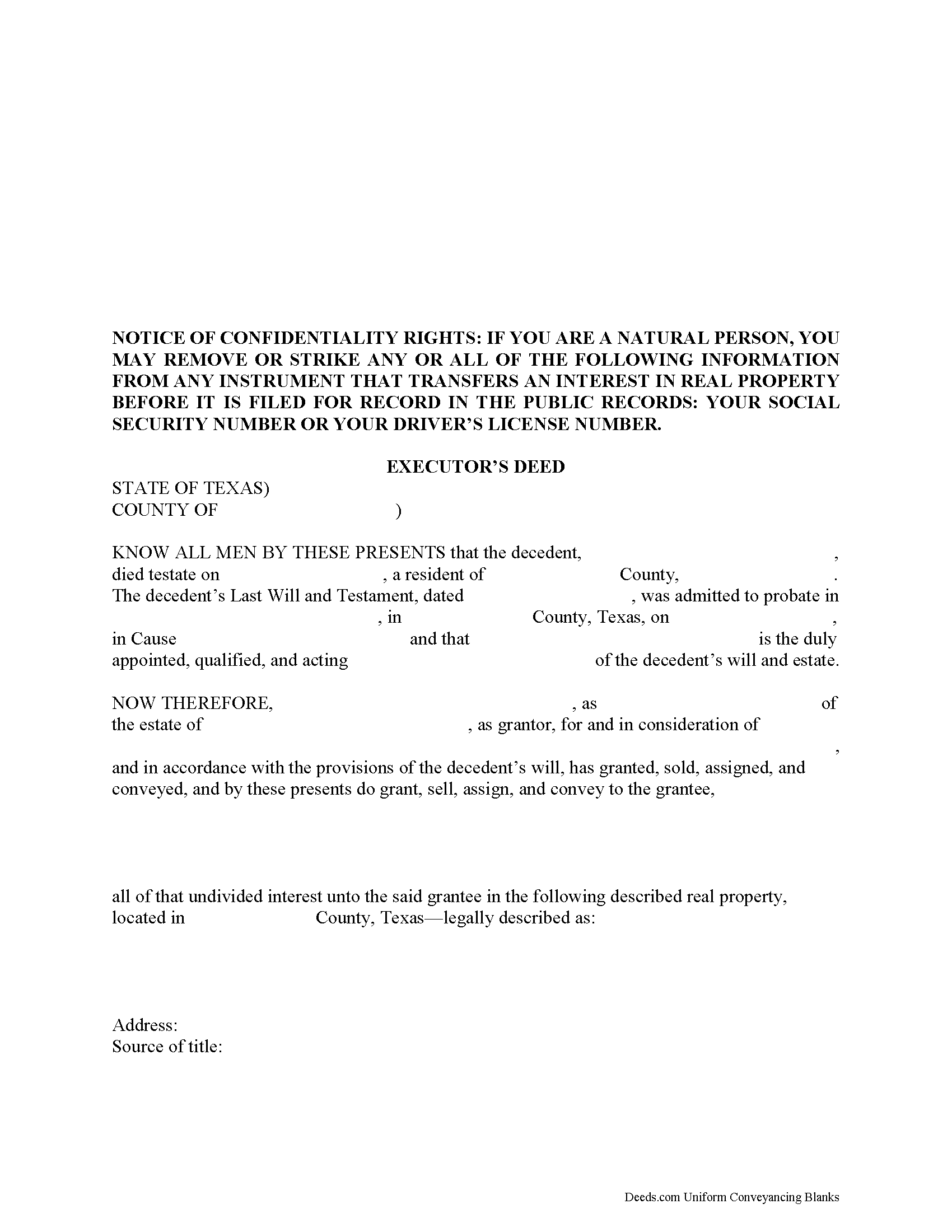
The Texas Statutes cover the rules for selling a decedent's property from a probate estate in Chapter 356 of the Estates Code.
When a will is admitted to probate, the court officer authorizes an executor to manage, and eventually close, the estate. Among other duties, this involves identifying the assets and liabilities, paying the bills, and distributing property according to the terms specified in the will.
Many estates contain real property. Depending on the circumstances, the executor might transfer the title to heirs as directed in the decedent's will or sell the property outright. In any case, the executor must issue a deed for the transfer. Note that executor's deeds do NOT typically include a general warranty on the title. The executor may offer a special warranty, meaning that he has the right to sell the property, and will only defend the title against claims on his actions.
An executor's deed is used by executors who are authorized by the Probate Court to transfer real property out of an estate. These instruments must meet the same requirements as a warranty deed or quitclaim deed, plus include additional information about the probate case. Sometimes, the exec... More Information about the Texas Executor Deed
Administrator Deed
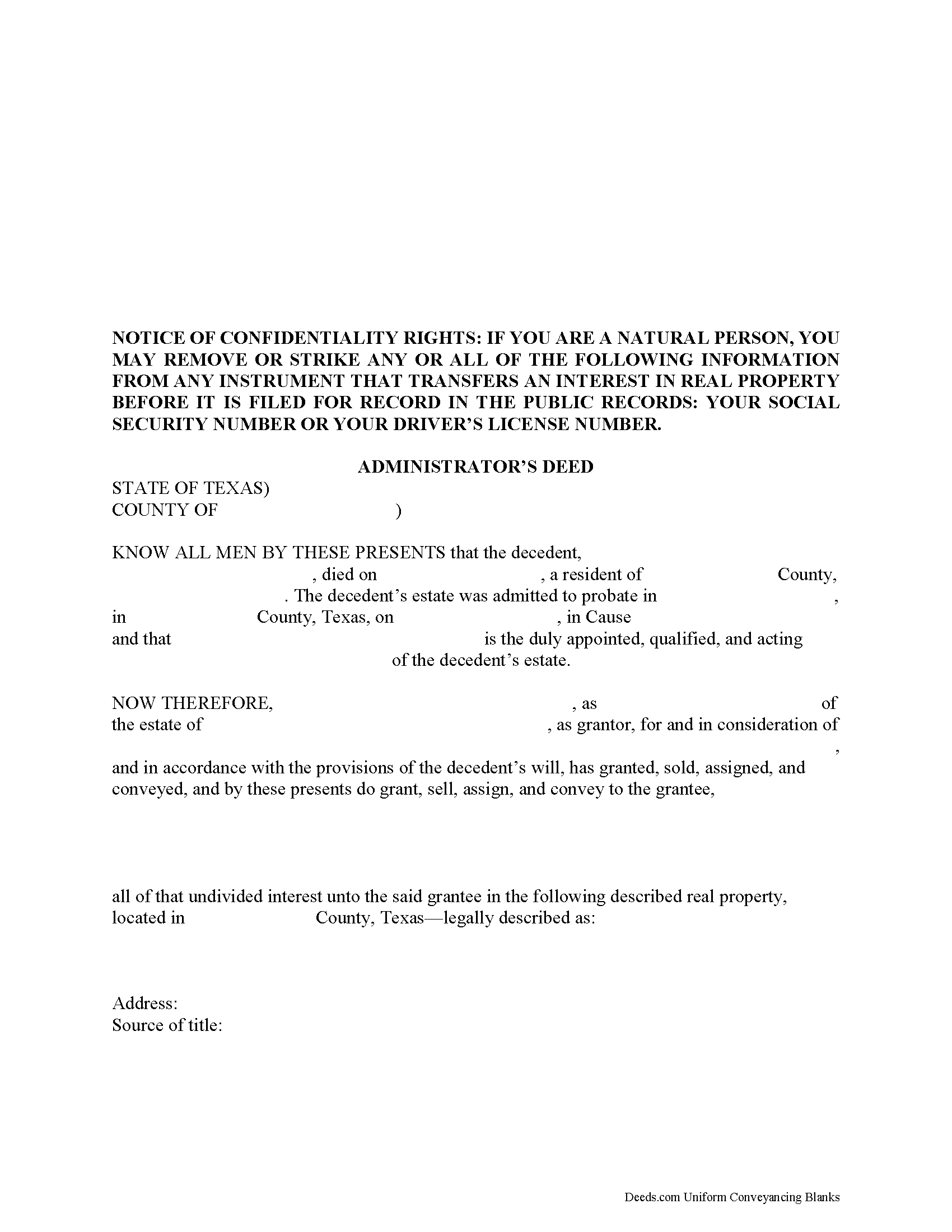
The Texas Statutes cover the rules for selling a decedent's property from a probate estate in Chapter 356 of the Estates Code.
When an estate is admitted to probate, the court officer authorizes a personal representative (PR) to manage, and eventually close, the estate. Among other duties, this involves identifying the assets and liabilities, paying the bills, and distributing property according to the terms specified in Texas law. If the property owner died with a will (testate), the PR is called an executor. If the individual died without a will (intestate), however, the court appoints a PR known as an administrator.
Many estates contain real property to distribute. Depending on the circumstances, the administrator might transfer the title to heirs as directed by the court or sell the property outright. These transfers require a specific document, known as an administrator's deed, to complete the change in ownership.
An administrator's deed is used to transfer real property out of an estate. These instruments must meet the same requirements for form and content as warranty or quitclaim deeds, as well as providing additional information about the probate case. Additional... More Information about the Texas Administrator Deed
Texas Affidavit of Heirship
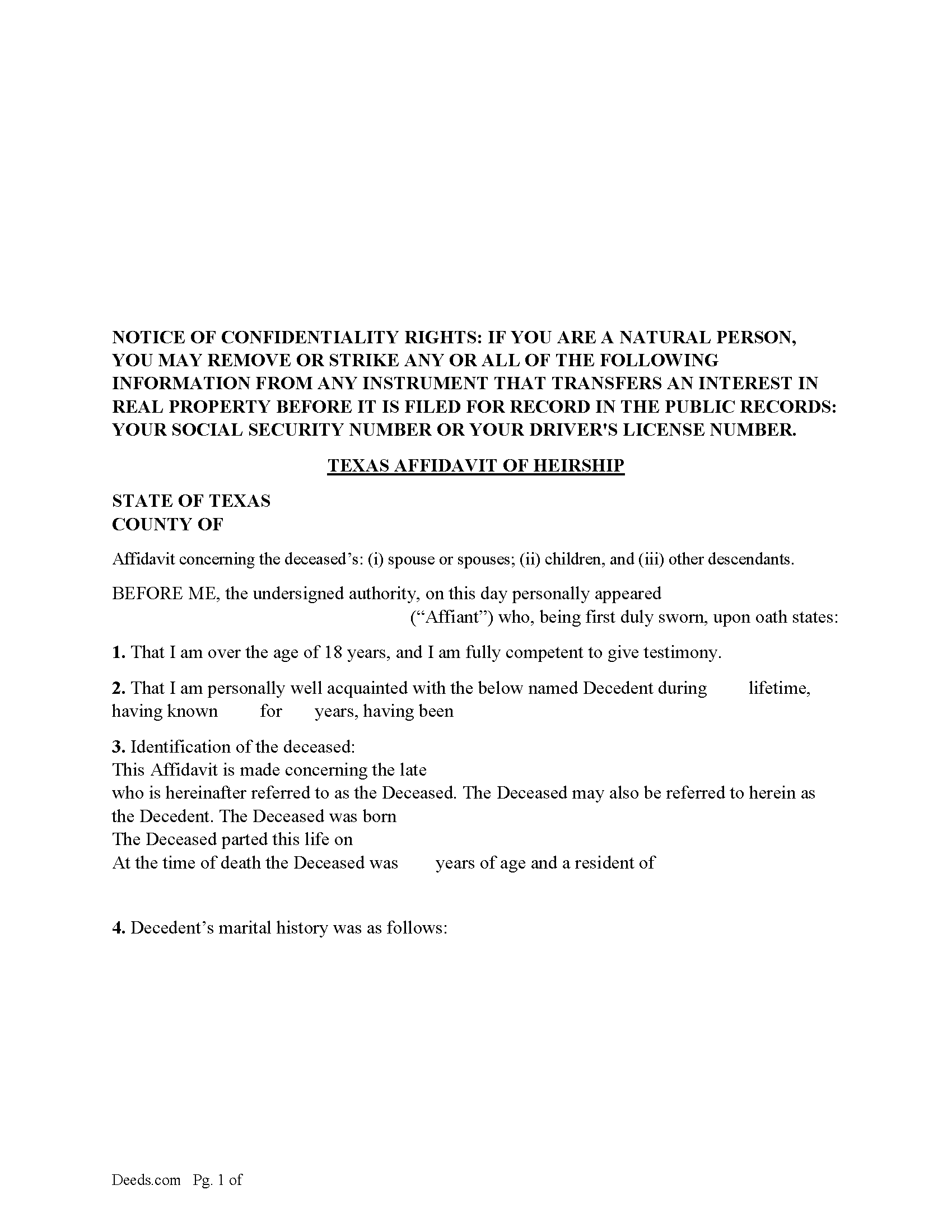
This form is typically used when the deceased did NOT leave a will or estate plan. The Affidavit of Heirship is a sworn statement used to establish the heirs of a property, with a goal of putting the property in their name. Sometimes this form is used to bypass probate when the deceased left a will that leaves the property solely to the direct descendants of the deceased or when 4 years have passed since the death of the owner, the general time frame to probate a will in Texas. An Affidavit of Heirship can be filed anytime. An Affidavit of Heirship alone does not transfer property title. It identifies the heirs of the property.
General parameters for a Texas Affidavit of Heirship document:
No valid will, or if beneficiaries and/or heirs agree to disregard the will.
Only real estate needs to be transferred to heirs.
The deceased does not have any debts.
No administration of estate required.
(Texas Affidavit of Heirship Package includes form, guidelines, and completed example)
... More Information about the Texas Texas Affidavit of Heirship
Trustee Deed
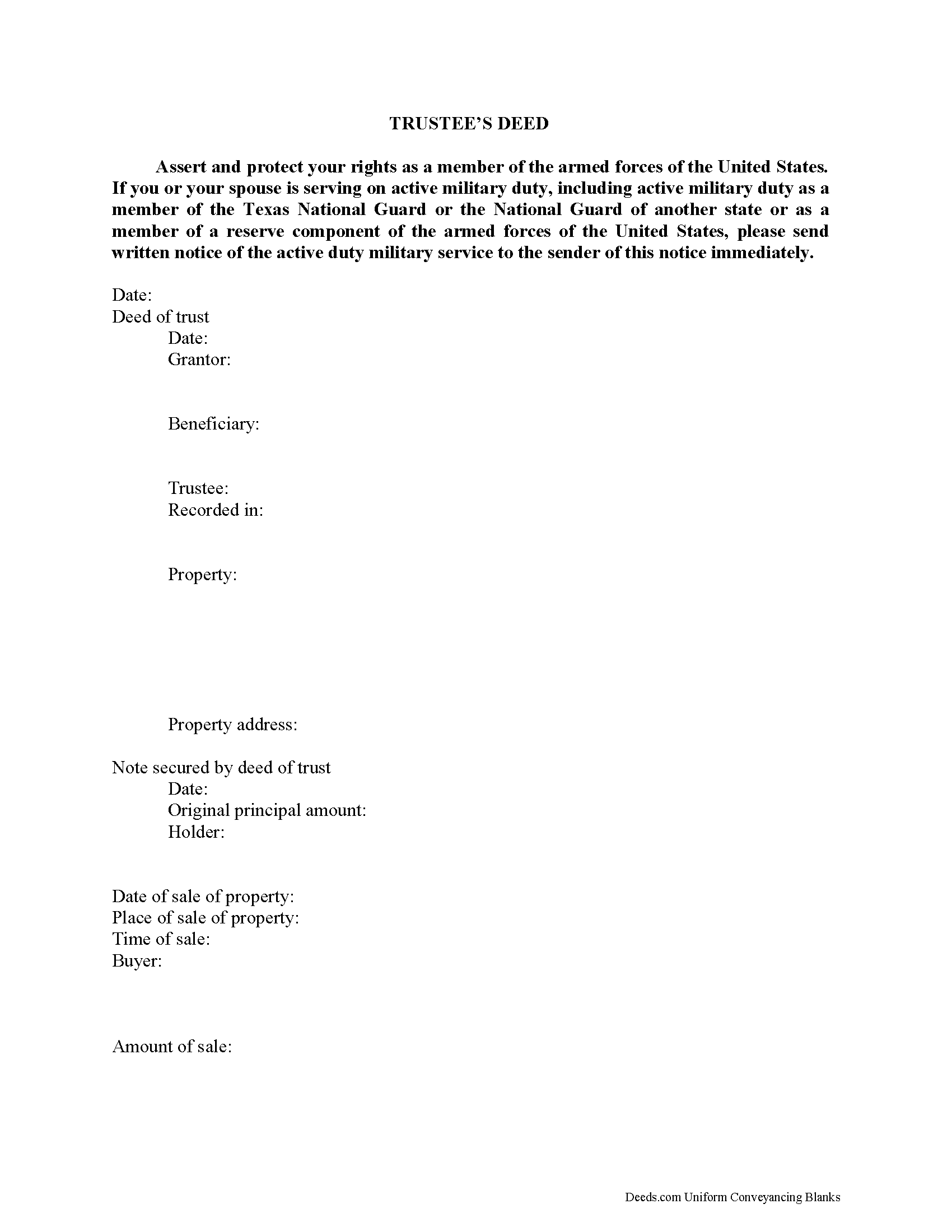
The majority of Texas foreclosures are non-judicial. They require a trustee's deed (alternately called a foreclosure deed or substitute trustee's deed, if applicable) to convey foreclosed property at a trustee's sale.
Trustee's deeds identify three primary parties: the grantor, who is the trustee in the deed of trust; the beneficiary, who is the lender and grantor in the deed of trust; and the buyer, who is the grantee and purchaser of the property at the foreclosure sale.
In a deed of trust, a trustee (the grantee under the original deed of trust instrument), appointed by the lender, holds the deed to the property as collateral for a loan to be repaid by the borrower (the trustor under the deed of trust). If the borrower fails to fulfill the terms of the deed of trust, the lender can direct the trustee to enforce the terms of the deed or begin the foreclosure process. This starts with a notice mailed to the borrower, now debtor, of the intent to accelerate. Notice of sale is also recorded and posted in the county where the subject property is located, as directed by Tex. Prop. Code 51.002 et seq.
A trustee's deed may sometimes be called a substitute trustee's deed, but i... More Information about the Texas Trustee Deed
Certificate of Trust
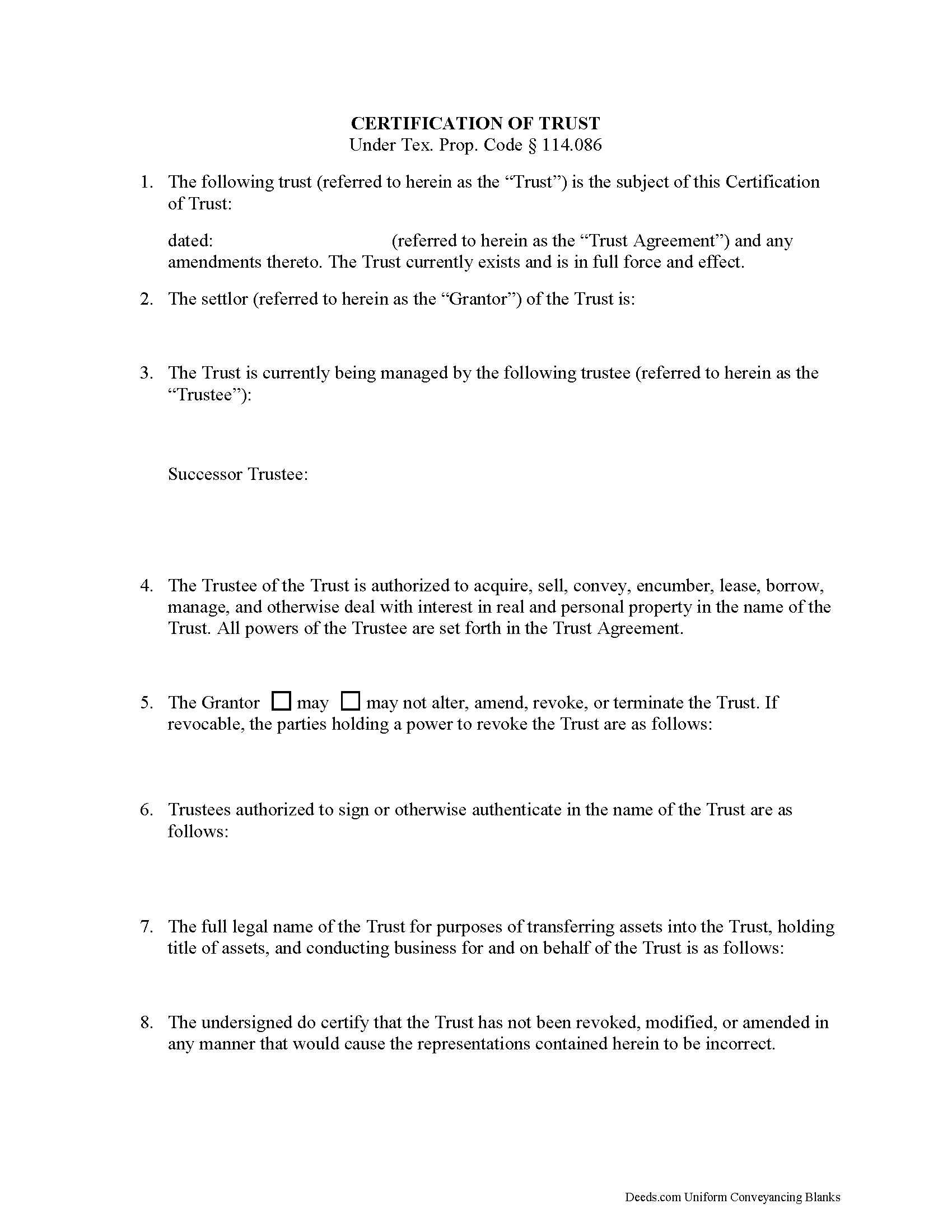
A certification of trust is a document that contains relevant details about an established trust containing real property. It is governed by Texas Property Code Sec. 114.086. A certification of trust validates the existence of the trust by identifying its full name, the date it was established, the names of the settlor (grantor) and trustees, the trustees' powers, and other details as needed. This is important because it allows the actual trust agreement, which is generally not recorded, to remain private.
The form is executed by the trustee and signed by the trustee and grantor (who can be the same person) and recorded in the office of the county recorder in any Texas county in which all or a portion of the real property is located. In order to facilitate a transfer of real property into a trust, financial institutions may require the trustee to furnish a certification of trust. In addition, third parties may request a certification of trust to confirm the trustee has the authority to transfer real property out of the trust.
(Texas Certificate of Trust Package includes form, guidelines, and completed example)... More Information about the Texas Certificate of Trust
Disclaimer of Interest
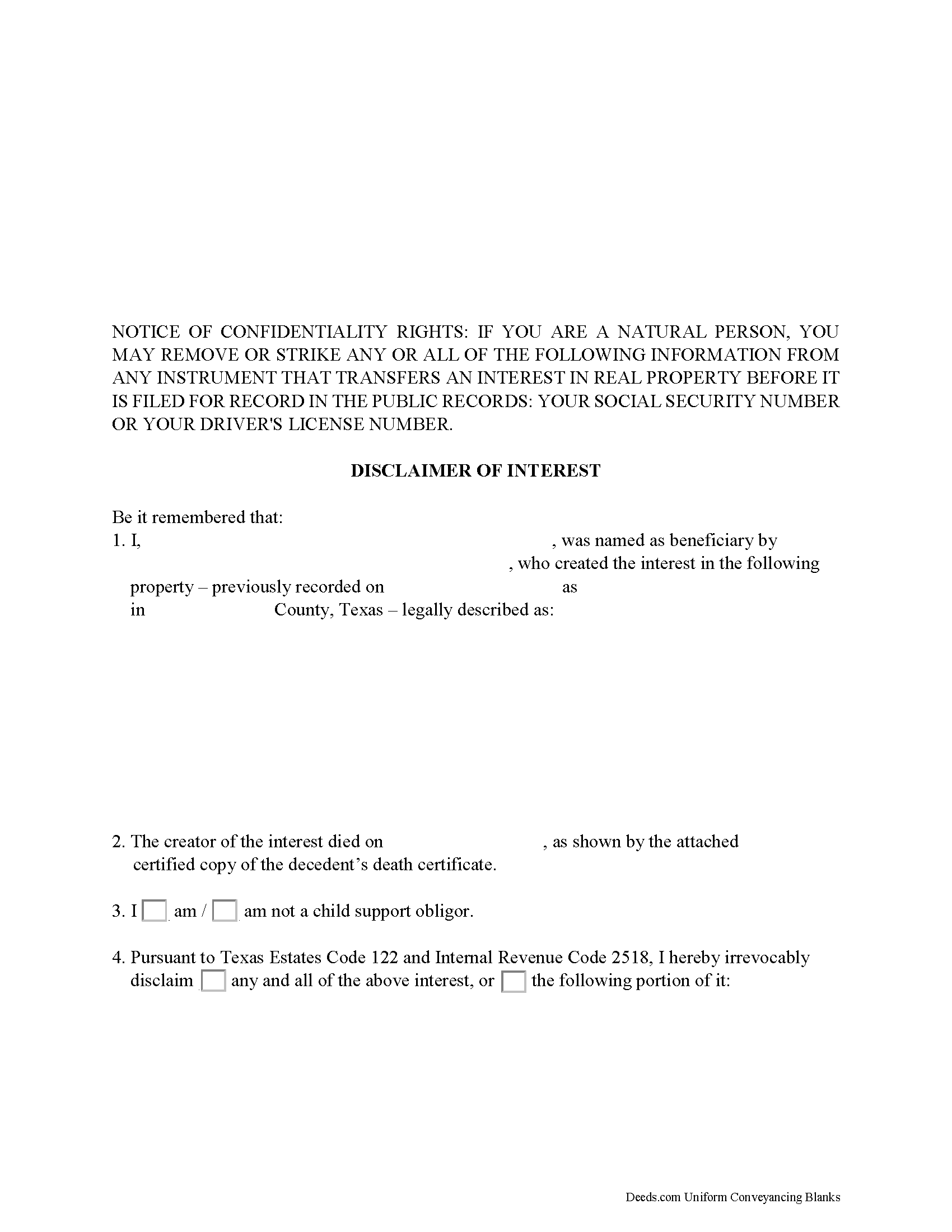
Use the disclaimer to renounce an interest in real property in Texas.
A beneficiary in Texas can disclaim a bequeathed asset or power (Texas Estates Code, Chapter 122). Such a disclaimer, which must be in writing and signed by the beneficiary or a legally authorized representative, allows that beneficiary to renounce his or her interest in the property, either in full or partially (122.151-153). A beneficiary who is a child support obligor, however, must fulfill his obligations prior to any renunciation of an interest (122.107).
A disclaimer is irrevocable and binding for anyone who makes a claim against the beneficiary, for example, potential creditors (122.003-004). Unless the beneficiary is a charitable organization or governmental agency of the state, the document must be received within nine months after the decedent's death, or other qualifying event (122.055), and it is only valid if no actions have indicated prior acceptance of the property (122.104).
The document must be filed with the probate court in the county where the will or estate is being administered, or the county clerk if estate proceedings are closed (122.052-053). If the decedent is not a resident of... More Information about the Texas Disclaimer of Interest
Mineral Deed
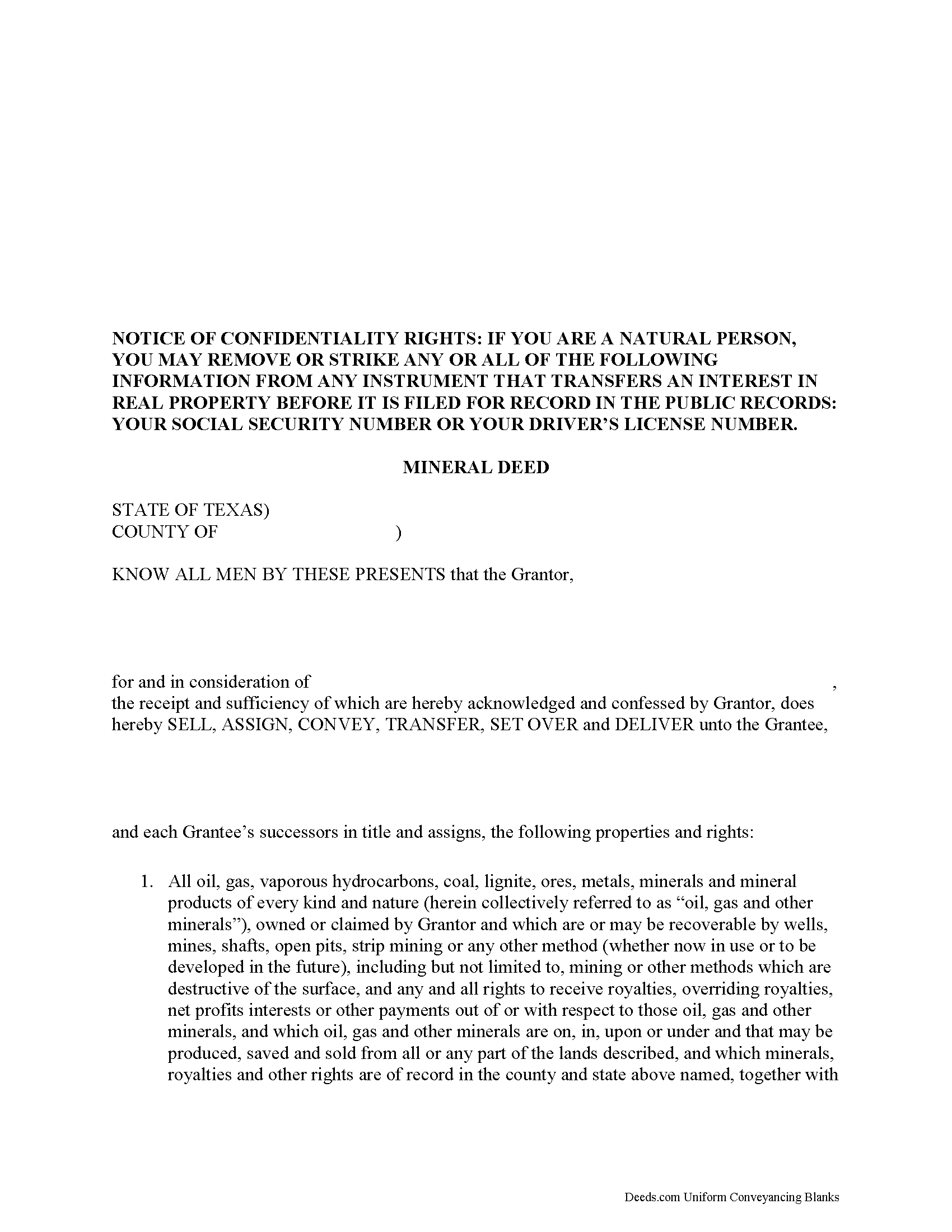
The General Mineral Deed in Texas transfers ALL oil, gas, and mineral rights from the grantor to the grantee. THIS IS NOT A LEASE. There are no Exceptions or Reservations included.
The transfer includes all oil, gas, vaporous hydrocarbons, coal, lignite, ores, metals, minerals and mineral products of every kind and nature. It also transfers any and all rights to receive royalties, overriding royalties, net profits interests or other payments out of or with respect to those oil, gas and other minerals.
This general mineral deed gives the grantee the right to extract by wells, mines, shafts, open pits, strip mining or any other method (whether now in use or to be developed in the future), including but not limited to, mining or other methods which are destructive of the surface.
Use of this document has a permanent effect on your rights to the property, if you are not completely sure of what you are executing seek the advice of a legal professional.
(Texas Mineral Deed Package includes form, guidelines, and completed example)... More Information about the Texas Mineral Deed
Mineral Quitclaim Deed
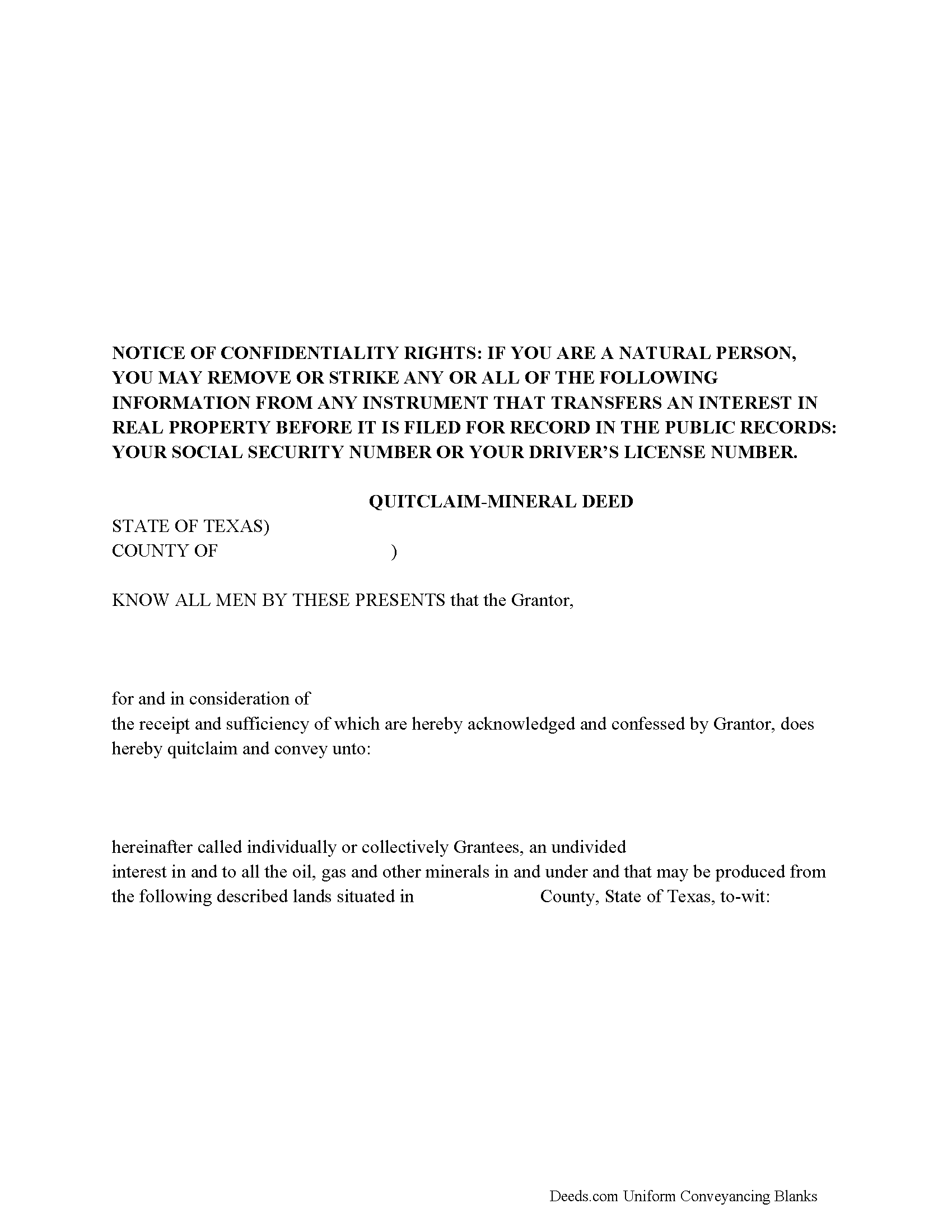
The General Mineral Deed in Texas Quitclaims oil, gas, and mineral rights from the grantor to the grantee. THIS IS NOT A LEASE. There are no Exceptions or Reservations included.
The transfer includes the oil, gas and other minerals of every kind and nature. The Grantor can stipulate the percentage of Mineral Rights the Grantee will receive.
This general mineral deed gives the grantee the right to access, for the purpose of mining, drilling, exploring, operating and developing said lands for oil, gas, and other minerals, and storing handling, transporting and marketing of such.
The seller, or grantor Quitclaims the mineral rights and does NOT accept responsibility to any discrepancy of title (This assignment is without warranty of title, either express or implied)
Uses: Mineral deeds with quitclaim are often used in situations where the grantor wants to quickly release any interest they might have in mineral rights, such as in settling estates, resolving disputes, clearing up uncertainties about ownership in a title's history or when mineral rights have previously been severed or fragmented from surface rights and cloud a title, making it difficult to transfer property. ... More Information about the Texas Mineral Quitclaim Deed
Specific Power of Attorney for the Purchase of Property
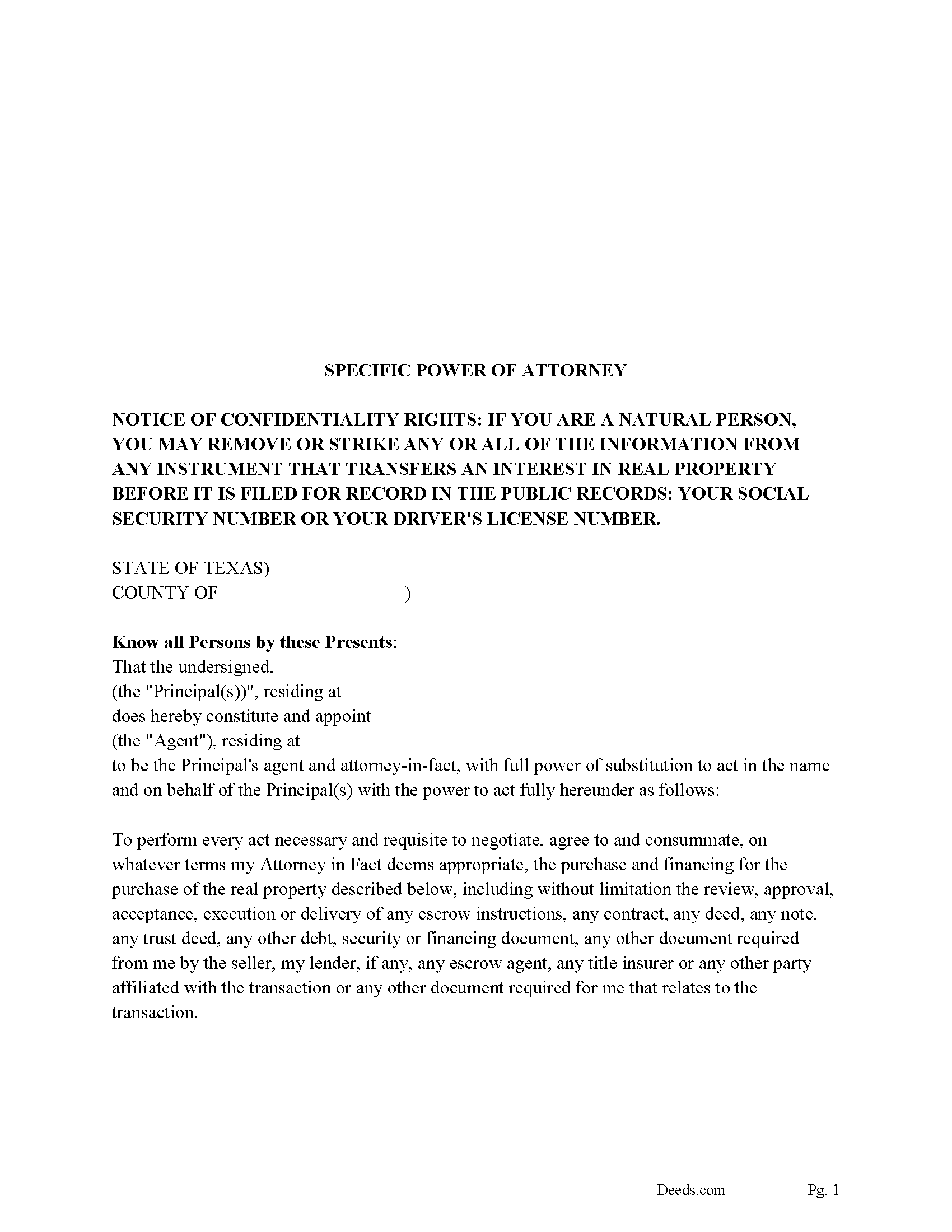
This is a specific power of attorney for the purchase of real property, in this form the principal(s) appoint an Agent to perform any tasks necessary to purchase and finance a specific property. There is a "Special Instructions" section where the principal can further limit/define the powers given. Since this document must be recorded it is formatted for county requirements and is governed by Texas laws.
This power of attorney is not affected by any subsequent disability or incapacity of the principal and shall be considered a "Durable Power of Attorney."
(Texas Specific POA Purchase Package includes form, guidelines, and completed example)... More Information about the Texas Specific Power of Attorney for the Purchase of Property
Specific Power of Attorney for the Sale of Property
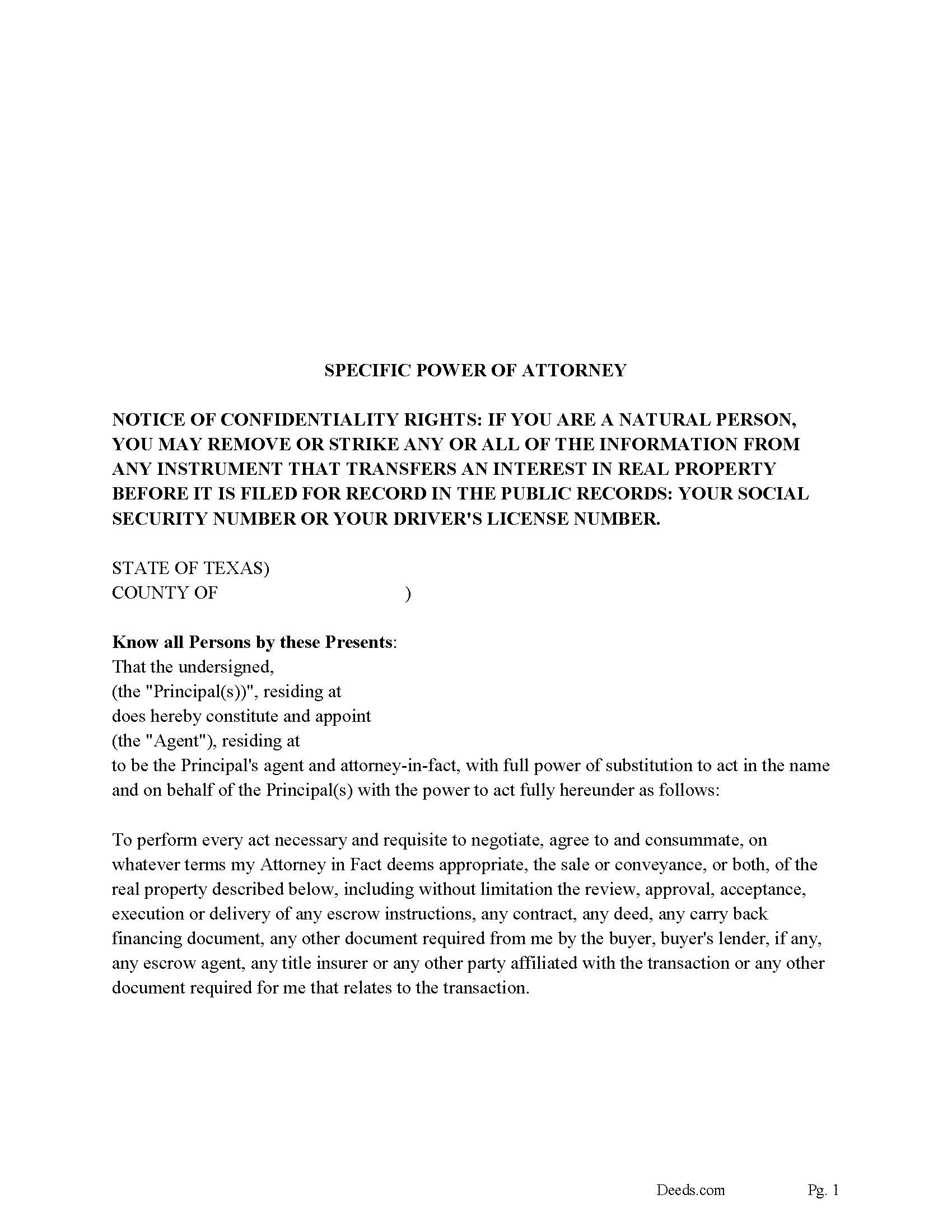
This is a specific power of attorney for the sale of real property, in this form the principal(s) appoint an Agent to perform any tasks necessary to sell or convey a specific property. There is a "Special Instructions" section where the principle can further limit/define the agents powers. Since this document must be recorded it is formatted for county requirements and is governed by Texas laws.
This power of attorney is not affected by any subsequent disability or incapacity of the principal and shall be considered a "Durable Power of Attorney."
(Texas Specific POA Sale Package includes form, guidelines, and completed example)... More Information about the Texas Specific Power of Attorney for the Sale of Property
Statutory Durable Power of Attorney
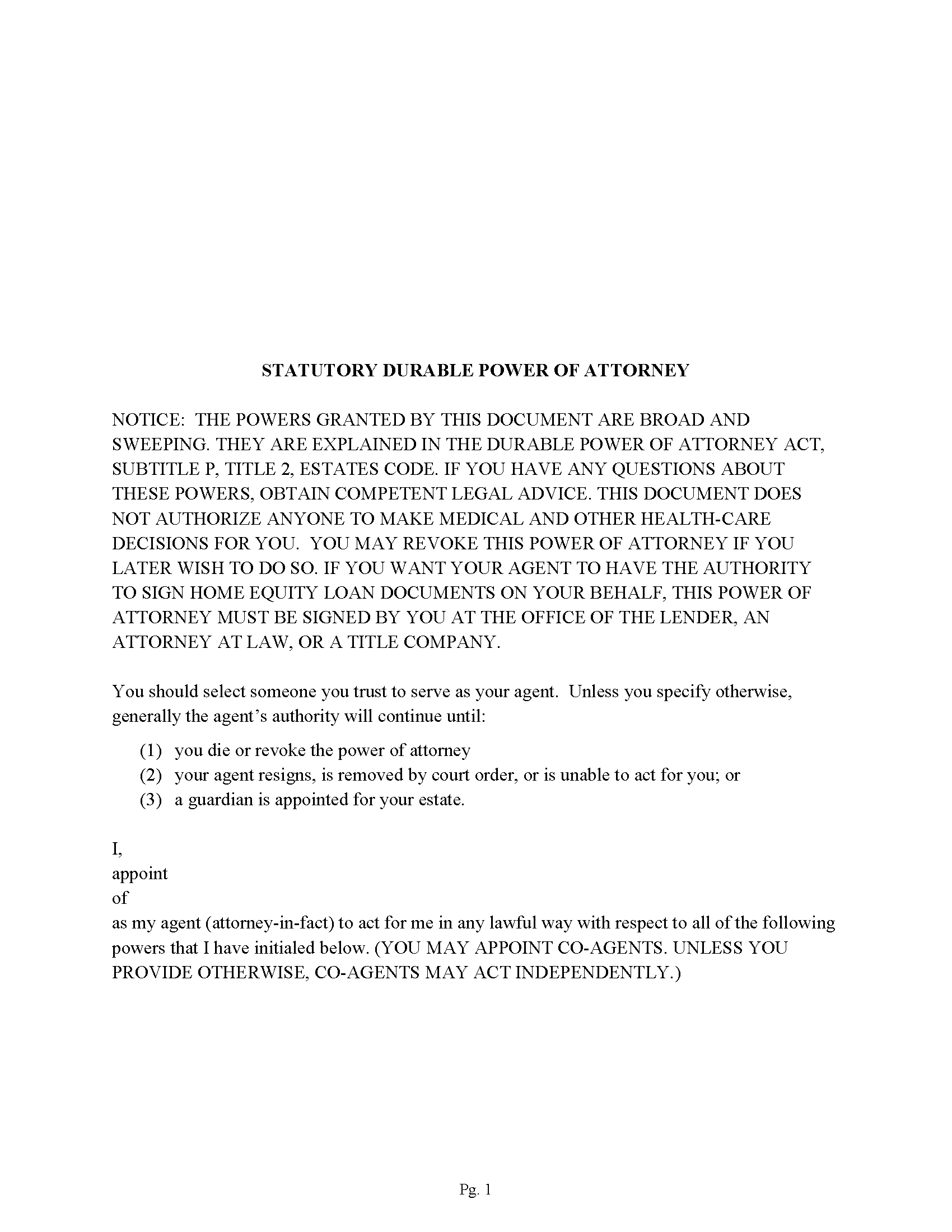
This form allows for up to 3 Alternate/Successor Agents, formatted for County recording requirements in Texas.
Powers addressed:
(A) Real property transactions;
(B) Tangible personal property transactions;
(C) Stock and bond transactions;
(D) Commodity and option transactions;
(E) Banking and other financial institution transactions;
(F) Business operating transactions
(G) Insurance and annuity transactions;
(H) Estate, trust, and other beneficiary transactions;
(I) Claims and litigation;
(K) Benefits from social security, Medicare, Medicaid, or other governmental programs or civil or military service;
(L) Retirement plan transactions;
(M) Tax matters;
(N) Digital assets and the content of an electronic communication;
(Texas Durable POA Package includes form, guidelines, and completed example)
... More Information about the Texas Statutory Durable Power of Attorney
Demand for Payment
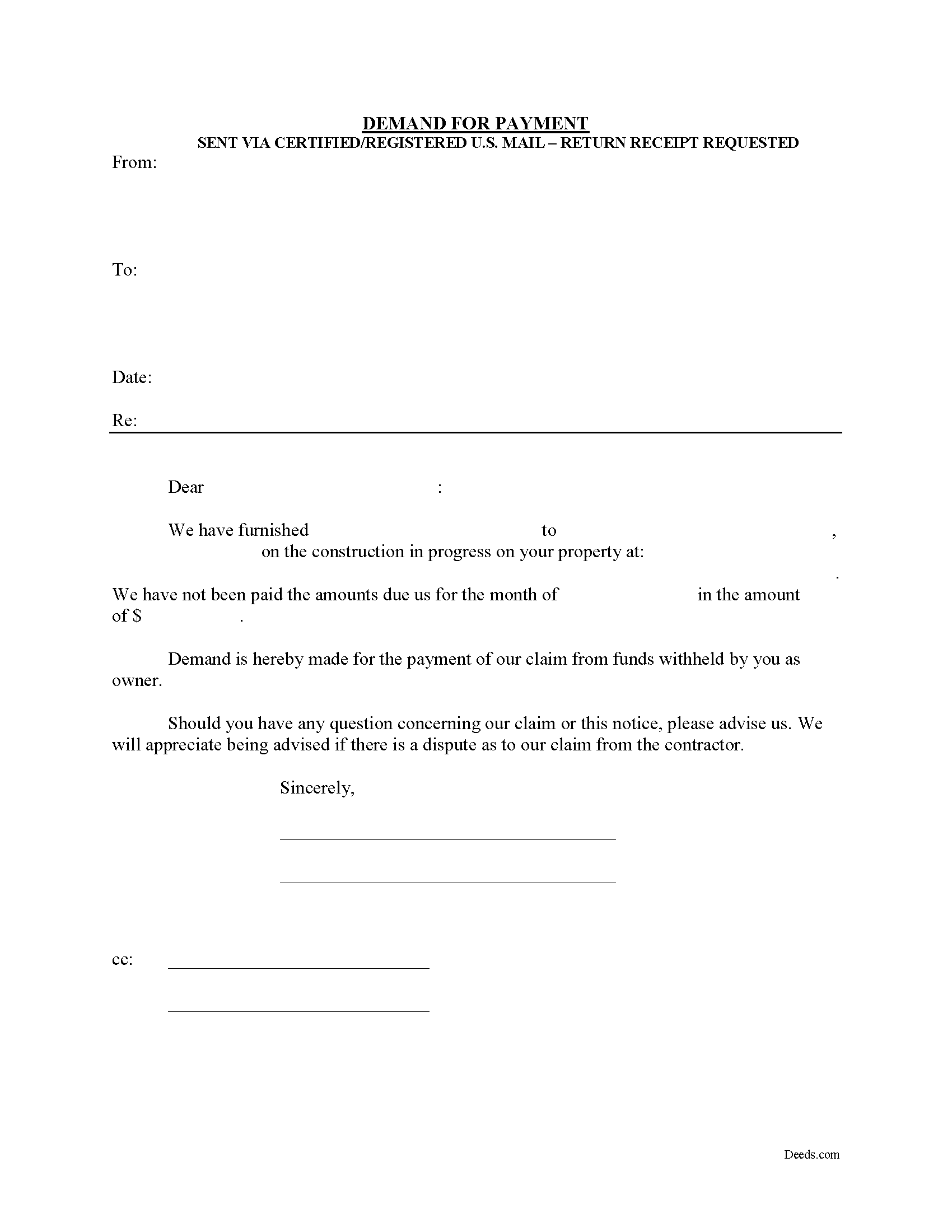
The Demand for Payment form is used by unpaid individual claimants to demand payment of their claim on an owner who is authorized to withhold funds under 53.083(a) of the Texas Property Code. The demand form also provides notice to the owner that all or part of the claim has accrued under Texas Code 53.053 or is past due under the agreement between the parties.
The claimant must also send a copy of the demand to the original contractor. If the original contractor intends to dispute the claim, he must give the owner written notice no later than the 30th day after the day he receives the copy of the demand. Failure to respond in a timely fashion implies approval of the demand and the owner must then pay the claim.
The Demand for Payment identifies the parties, the project, and relevant dates, services/materials, and fees. It is a required step in securing an eventual mechanic's lien on the owner's property if the claim remains unpaid after demand is sent.
The form does not require a notary seal or other verification, nor is it filed in the local land records. Instead, deliver the demand for payment via certified or registered mail, with a return receipt requested.
Each c... More Information about the Texas Demand for Payment
Notice of Contractual Retainage
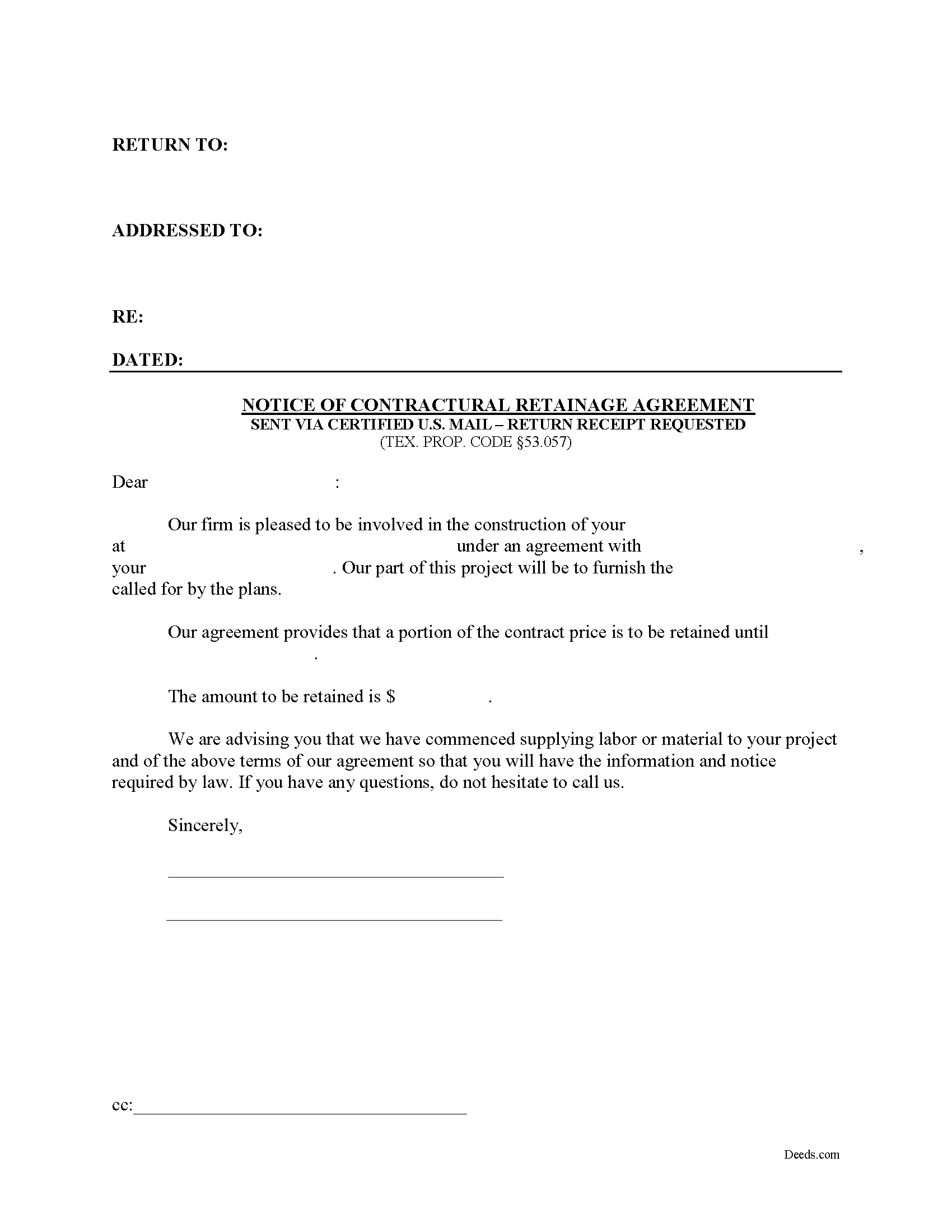
As a contractor, it's important to send out early notice forms shortly after beginning work on a construction job. By putting all interested parties on notice, claimants can help protect their lien rights. One important early notice form is called a Notice of Contractual Retainage, as defined at Sec. 53.057 of the Texas Property Code.
Retainage means an amount representing part of a contract payment that is not required to be paid to the claimant within the month following the month in which labor is performed, material is furnished, or specially fabricated material is delivered. TEX. PROP. CODE 53.001(11). Simply put, it is a portion of the agreed upon contract price that is deliberately withheld until the work reaches substantial completion to assure that contractor or subcontractor will satisfy its obligations and complete a construction project. If the job is not up to par, the retainage amount is used to make any changes or fixes.
Give this notice to all other interested parties to make them aware that the person who hired you is withholding a retainage amount from you under your contract. Therefore, once provided with the notice, the other parties above you can withhold... More Information about the Texas Notice of Contractual Retainage
Notice of Specially Manufactured Materials
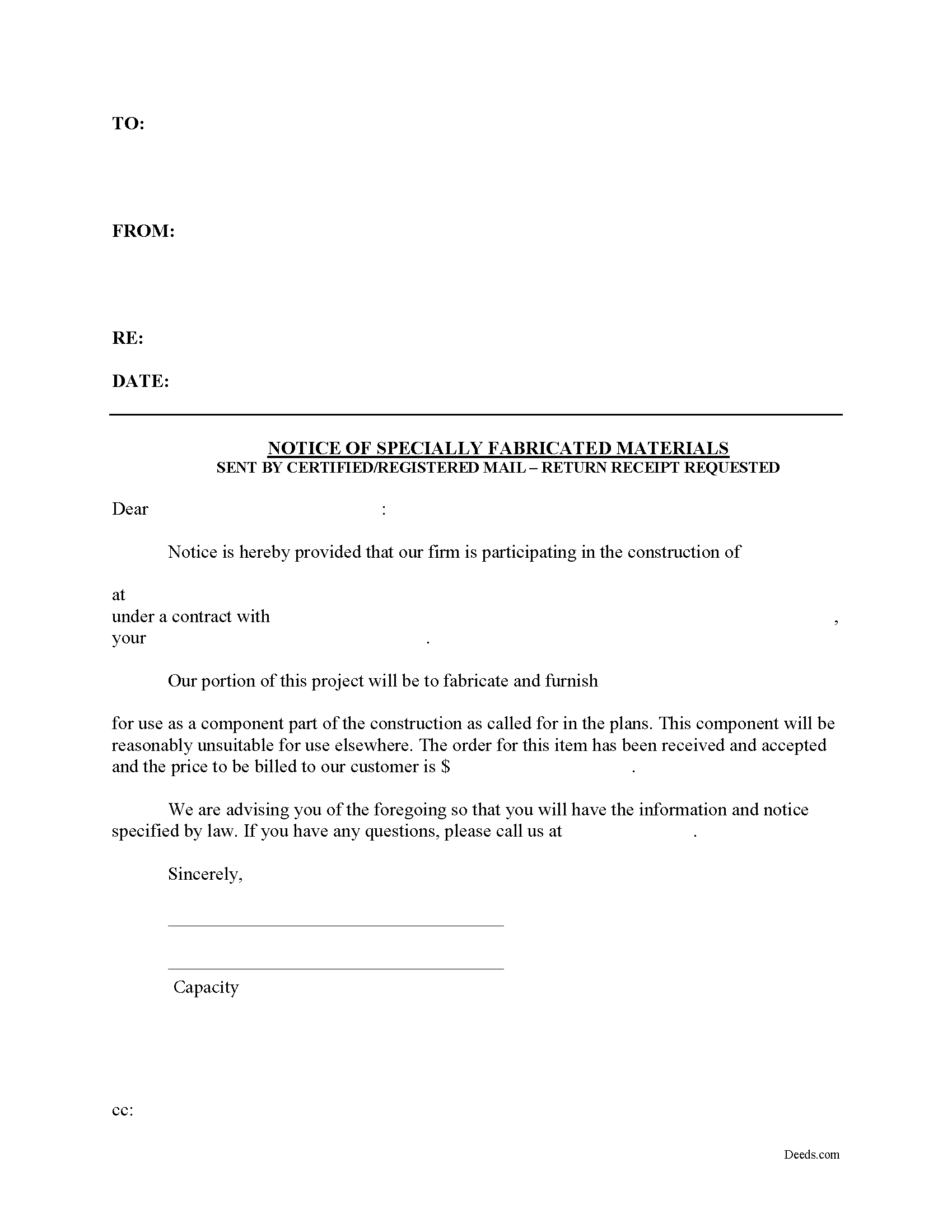
Construction projects often demand custom materials that are only suitable for that specific job, due to unique dimensions of the materials or other customized aspects as specified by the customer. These materials are not suitable for use in other projects, except as possible salvage or scrap with a greatly diminished value.
Suppliers of specially manufactured items that are not reasonably suitable for other jobs may serve the Notice of Specially Manufactured Items as set out at Sec. 53.058 of the Texas Property Code. This notice is not required, but under 53.023(2), a person who creates such job-specific materials is entitled to lien, even if the materials were never delivered to the job site.
These claimants must also serve the Notice of Contractual Retainage, along with either a Second Month Notice or a Third Month Notice, warning the contractor and owner about the outstanding debt.
The document identifies the parties and the project, describes the materials, and lists the relevant dates, fees, and payments, if any. The Notice of Specially Manufactured Materials is not recorded in a county public records office and does not need to be verified or notarized. Simply fill... More Information about the Texas Notice of Specially Manufactured Materials
Preliminary Notice to Original Contractor
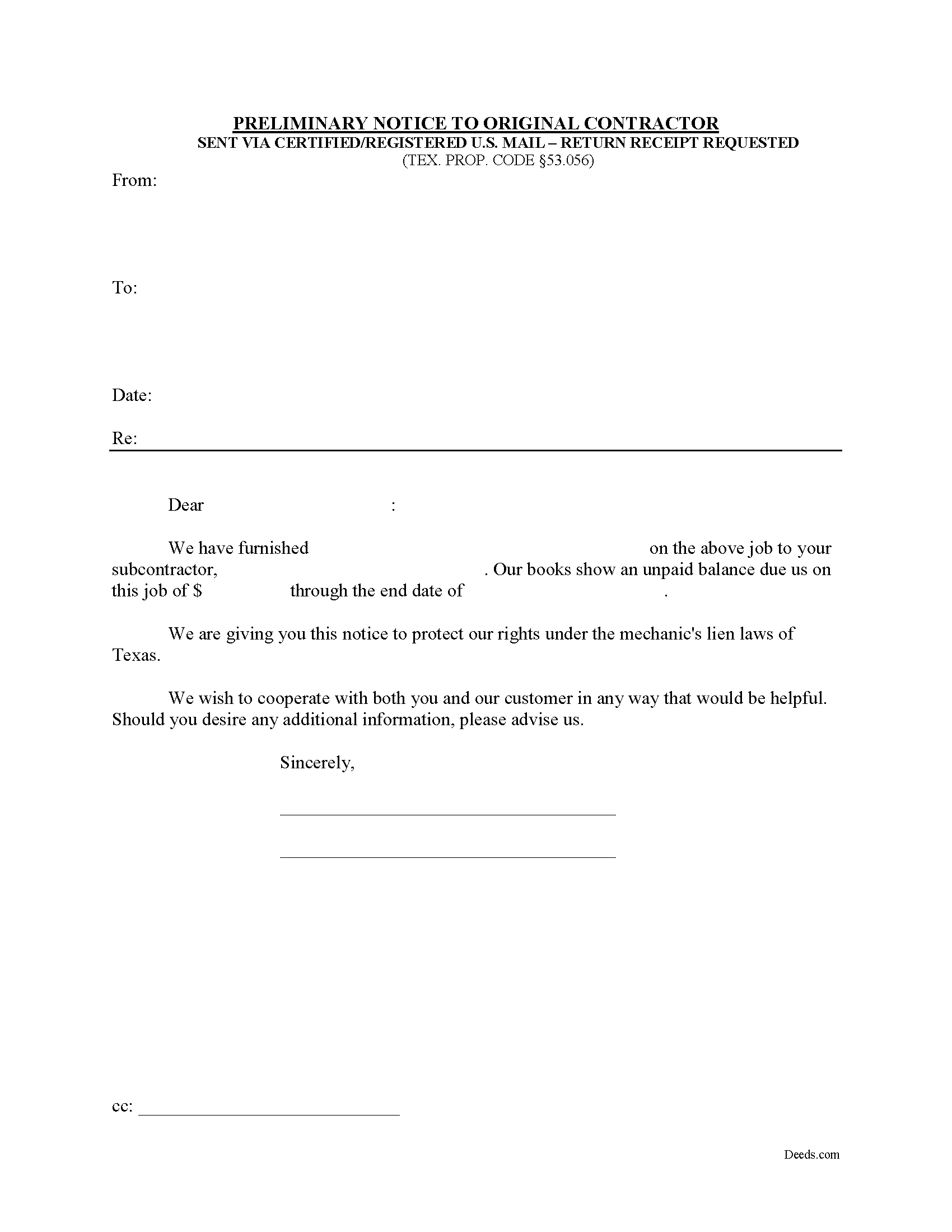
Texas Second Month Notice
According to Texas lien law, all claimants other than the original contractor must provide preliminary notice to establish a claim for a valid mechanic's lien. TEX. PROP. CODE 53.056. Use the preliminary notice form under 53.056(b) when lien claim arises from a debt incurred by a subcontractor.
A mechanic's lien is an encumbrance on an owner's title, used to guarantee payment to builders, contractors, and construction businesses which build or repair structures, by using the property where the work was completed as a form of collateral. Suppliers of materials and subcontractors may also claim a mechanic's lien. The lien ensures that the workmen are paid before anyone else if the property subject to the lien is eventually foreclosed upon.
The law states that before filing and recording a mechanic's lien, the claimant must give written notice of the unpaid balance to the original contractor. Texas requires prelien notice to be served on the owner and other interested parties. Prelien notices serve two purposes: to protect the interests of subcontractors and suppliers, and to give property owners a defense against having to pay twice for parts of t... More Information about the Texas Preliminary Notice to Original Contractor
Preliminary Notice to Owner and Original Contractor
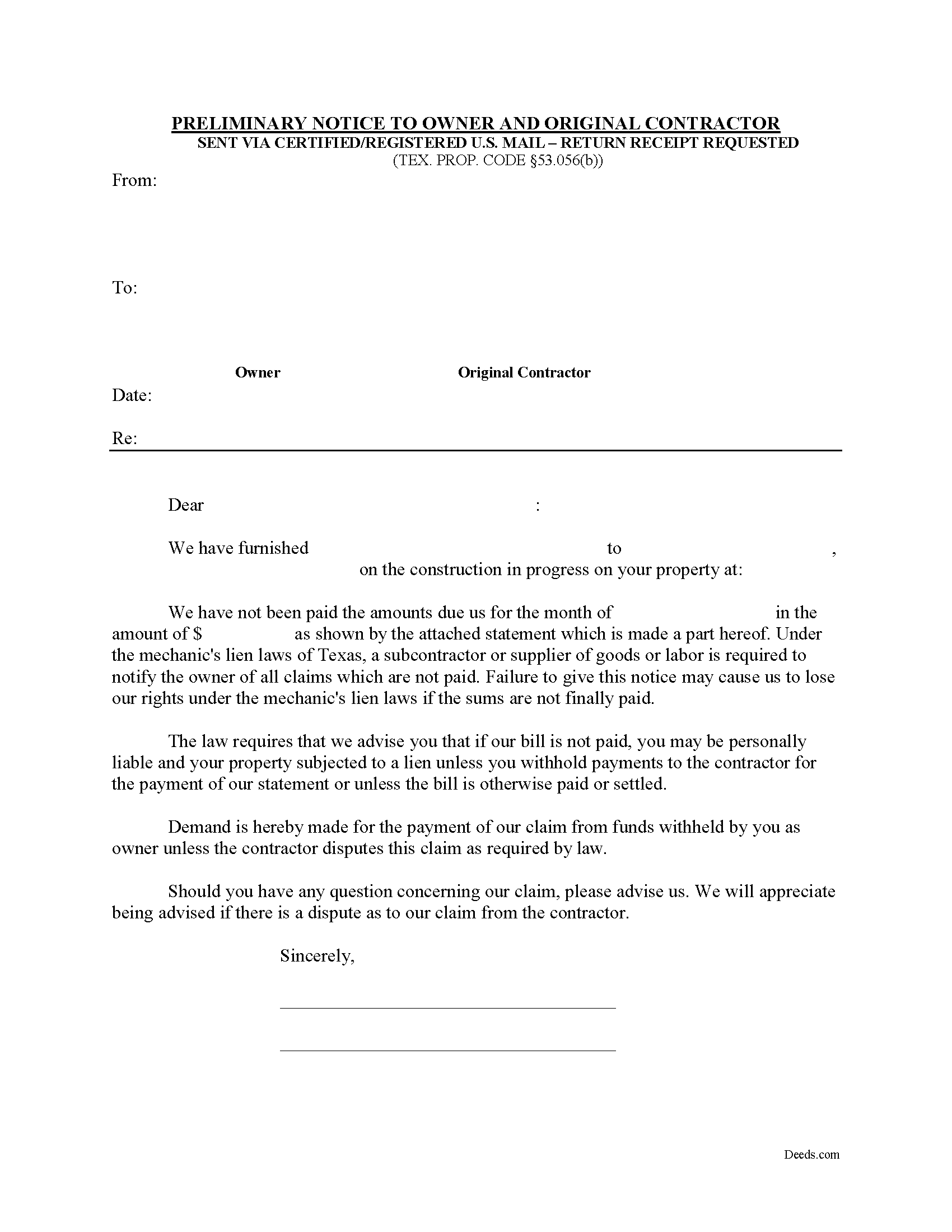
Texas Third Month Notice
Under Texas lien law, all claimants other than the original contractor must provide preliminary notice to establish a claim for a valid mechanic's lien. TEX. PROP. CODE 53.056(a).
A mechanic's lien is an encumbrance on an owner's title, used to guarantee payment to builders, contractors, and construction businesses which build or repair structures, by using the property where the work was completed as a form of collateral. Suppliers of materials and subcontractors may also claim a mechanic's lien. The lien ensures that the workmen are paid before anyone else if the property subject to the lien is eventually foreclosed upon.
Texas requires prelien notice to be served on the owner and other interested parties before filing and recording a mechanic's lien. The type of project (whether residential or commercial) determines what kind of prelien notice must be served. Prelien notices serve two purposes: to protect the interests of subcontractors and suppliers, and to give property owners a defense against having to pay twice for parts of the same project.
If the lien claim arises from a debt incurred by the original contractor, the claimant must give... More Information about the Texas Preliminary Notice to Owner and Original Contractor
Affidavit of Lien
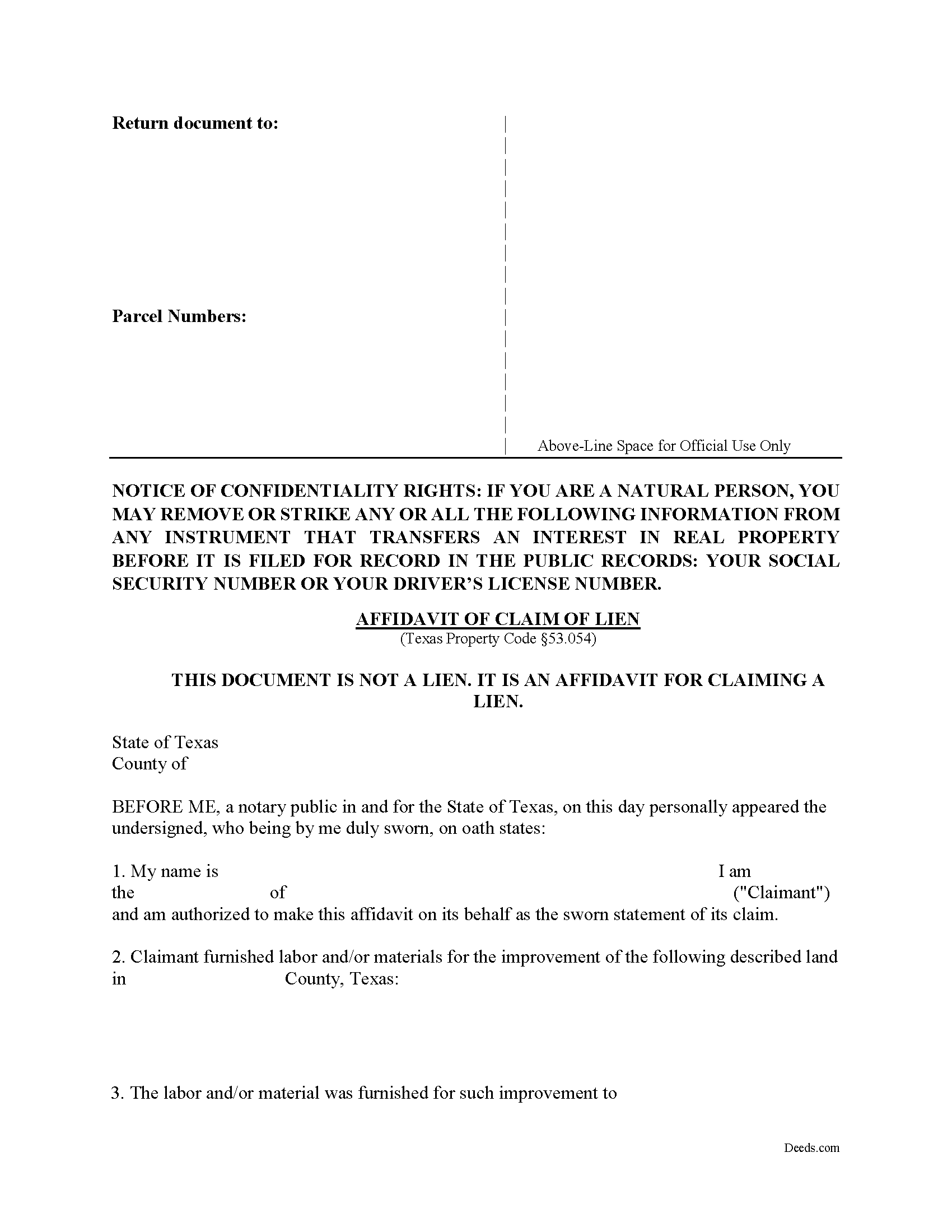
An affidavit is a sworn statement of fact, in writing, made by an affiant under oath or affirmation, administered by a person lawfully authorized (such as a notary public). In this case, the affiant states that labor or equipment was furnished by the lien claimant and the balance owed remains unpaid. The affidavit is not a lien, but sets out sworn facts based on personal knowledge, that when recorded, will later become the lien. It is a necessary step to perfect (make effective against third parties) the lien.
To claim a lien for a commercial job, the affiant must file an affidavit with the county clerk of the county in which the property is located, not later than the 15th day of the fourth calendar month after the day on which the indebtedness accrues. TEX. PROP. CODE 53.052(a).
Note that for residential construction projects, the claimant must file the affidavit with the county clerk no later than the 15th day of the THIRD (3rd) calendar month after non-payment of the invoice. TEX. PROP. CODE 53.052(b).
The affidavit must substantially comply with the Texas Property Code. Therefore, the it must contain: 1) a signature by the person claiming the lien or by another per... More Information about the Texas Affidavit of Lien
Request for Information from Owner
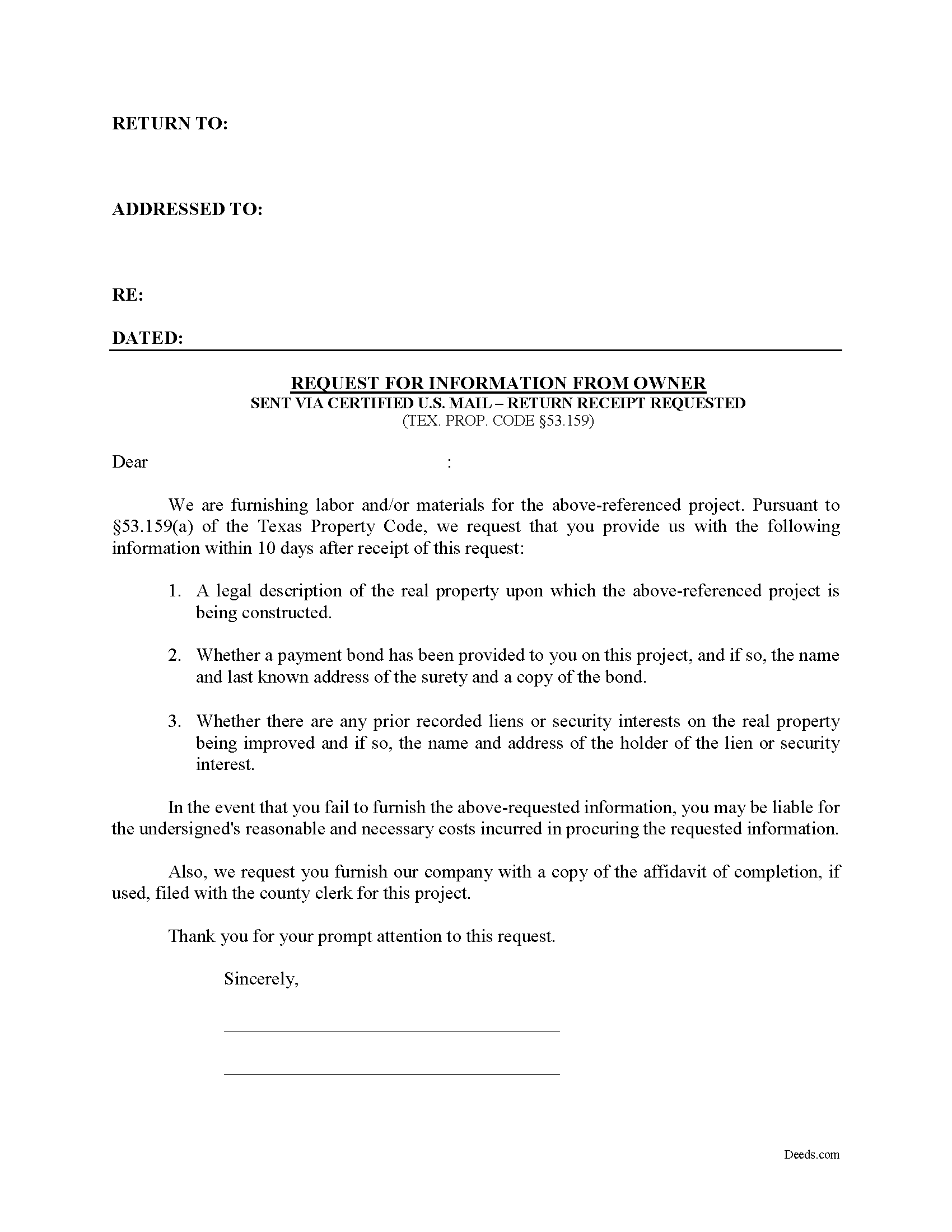
What information must the owner provide on a Texas construction project?
The Request for Information from Owner is a form letter used to obtain information from the property owner on a construction job. The required information from the owner includes a description of the real property, details of any surety bond posted, whether there are prior recorded liens or security interests on the property, and the date on which the original contract for the project was executed.
Under TEX. PROP. CODE 53.159(a), upon a written request, the property owner must provide the information within a reasonable time to anyone who furnished labor or materials. The owner must respond no later than the 10th day after the date the request is received.
If the requester is not in direct contractual relationship with the owner on the project, the owner may require payment of the actual costs in producing the information which cannot exceed $25.00. TEX. PROP. CODE 53.159(e). Therefore, some people choose to enclose a check with the request form, up to $25.00, to cover any costs.
If the owner fails to furnish the required information, he or she may be liable for reasonable and necessary costs incu... More Information about the Texas Request for Information from Owner
Request for Information from Subcontractor
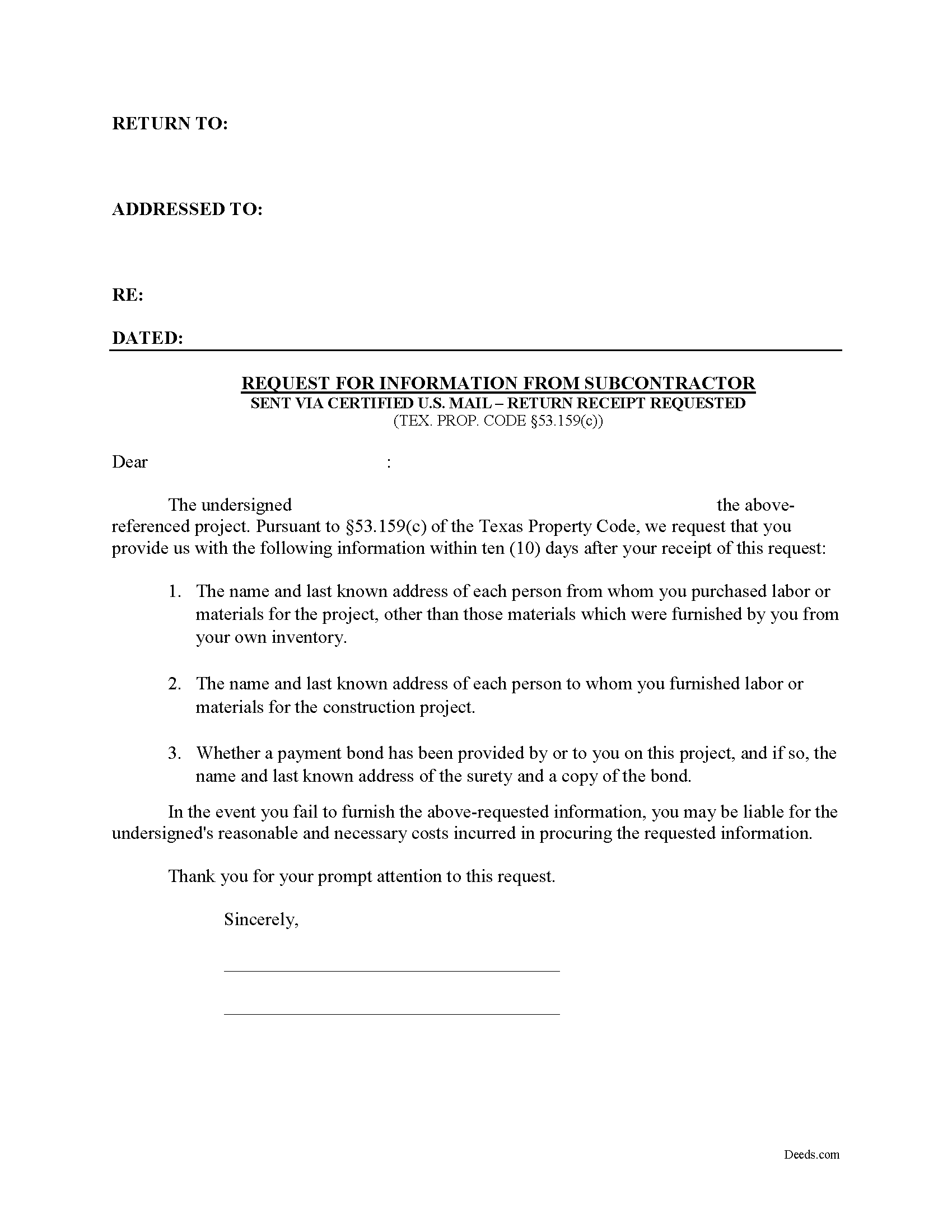
How to obtain information from a subcontractor on a private project:
The Request for Information from a Subcontractor is a form letter used to obtain information from a subcontractor regarding the identity of persons the subcontractor furnished with labor or materials, persons furnishing labor or materials to the subcontractor, and details on whether any payment bond has been posted.
Under TEX. PROP. CODE 53.159(c), a subcontractor, on written request by an owner of the property being improved, the original contractor, a surety on a bond covering the original contract, or any person furnishing work under the subcontract, shall furnish to the person the following information within a reasonable time, but not later than the 10th day after the date they receive the request:
1) The names and addresses of each person the subcontractor purchased labor or materials for the project (other than those materials which the subcontractor furnished his or her own inventory)
2) The names and addresses of each person that the subcontractor furnished labor or materials for the construction project.
3) Whether a payment bond has been provided on the project, and the name and address of th... More Information about the Texas Request for Information from Subcontractor
Request for Information from Original Contractor
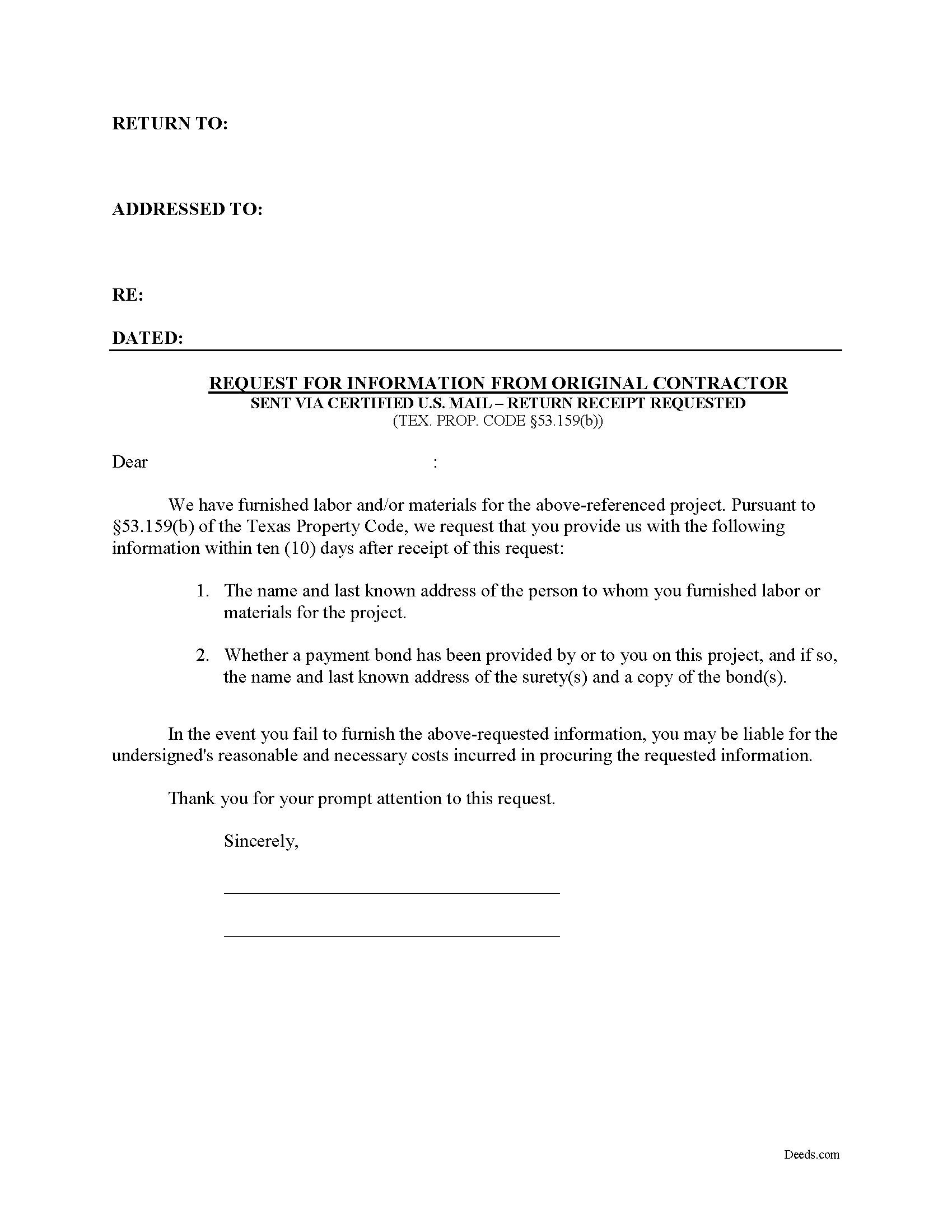
The Request for Information from Original Contractor is a form letter used to obtain information from the contractor regarding the identity of persons furnished with labor or materials, whether a payment bond has been posted, and project dates.
Under TEX. PROP. CODE 53.159(b), upon a written request, an original contractor who furnished work under the original contract shall furnish to the person the following information within a reasonable time, but not later than the 10th day after the date the request is received:
(1) The name and last known address of the person to whom the original contractor furnished labor or materials for the construction project;
(2) Whether the original contractor has furnished or has been furnished a payment bond for any of the work on the construction project and if so, the name and last known address of the surety and a copy of the bond; and
(3) The date on which the original contract for the project was executed.
Serve the form to the original contractor through certified U.S. Mail with return receipt requested. It does not need to be verified or notarized. Note that if the requester is not in direct contractual relationship with the con... More Information about the Texas Request for Information from Original Contractor
Conditional Waiver and Release on Progress Payment
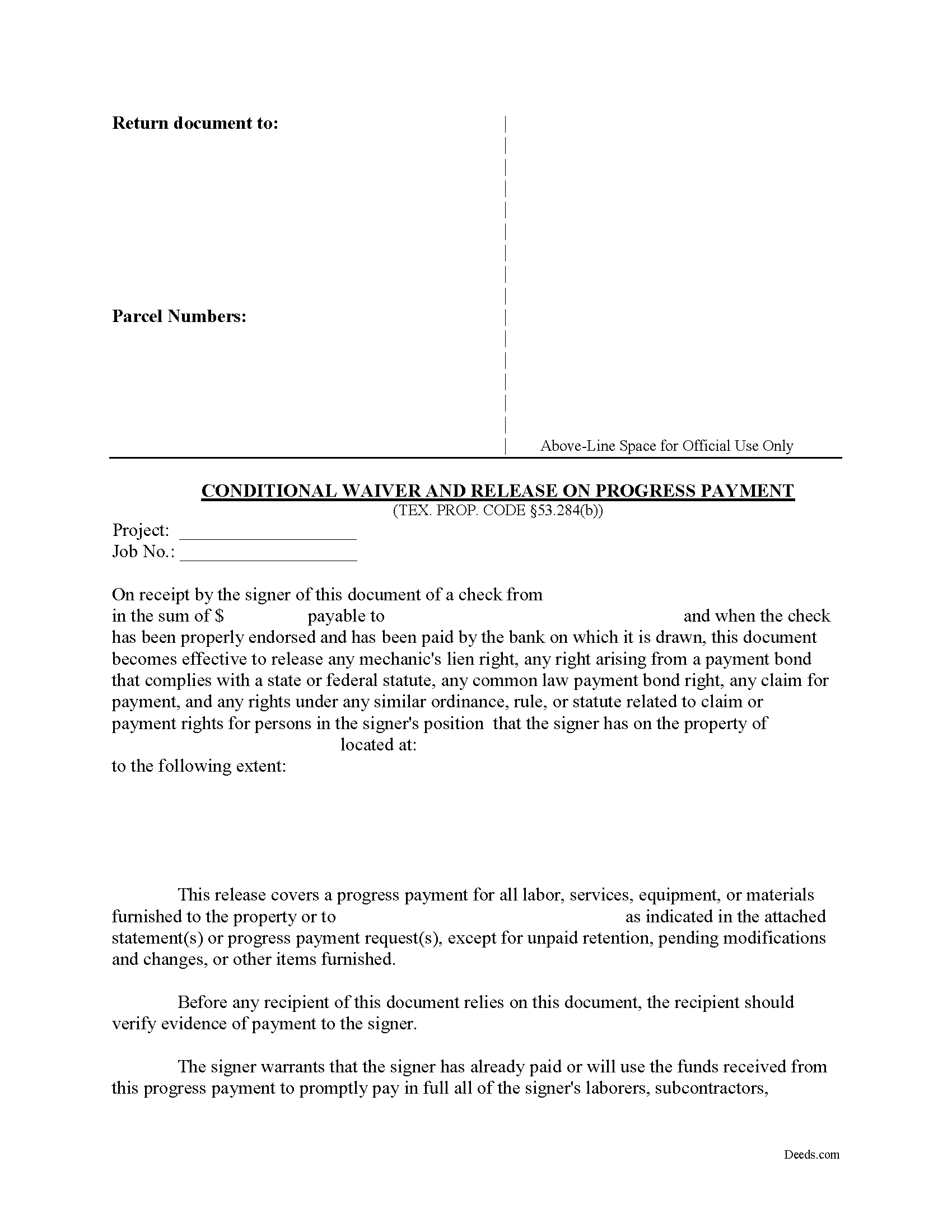
A lien waiver is used by a lien claimant or potential claimant to forfeit his or her right to a lien upon a progress payment or final payment. The waiver can be conditional, meaning that the payment must clear the bank before the lien is released, or unconditional, meaning the lien is released upon the recording of the waiver regardless of whether or not the claimant is ever actually paid.
A waiver and release given by a claimant or potential claimant is unenforceable unless it substantially complies with the applicable form described in Sec. 53.284 of the Texas Property Code.
The four types of lien waivers in the State of Texas include:
- Conditional Waiver and Release on Progress Payment;
- Unconditional Waiver and Release on Progress Payment;
- Conditional Waiver and Release on Final Payment; and
- Unconditional Waiver and Release on Final Payment
Let's say a contractor reaches an agreed-upon point a project where she previously recorded a lien. The owner wants the lien released up to that point, and writes a check for the amount due on the work completed. The contractor offers a conditional waiver and release on progress payment, which protects h... More Information about the Texas Conditional Waiver and Release on Progress Payment
Conditional Waiver and Release on Final Payment
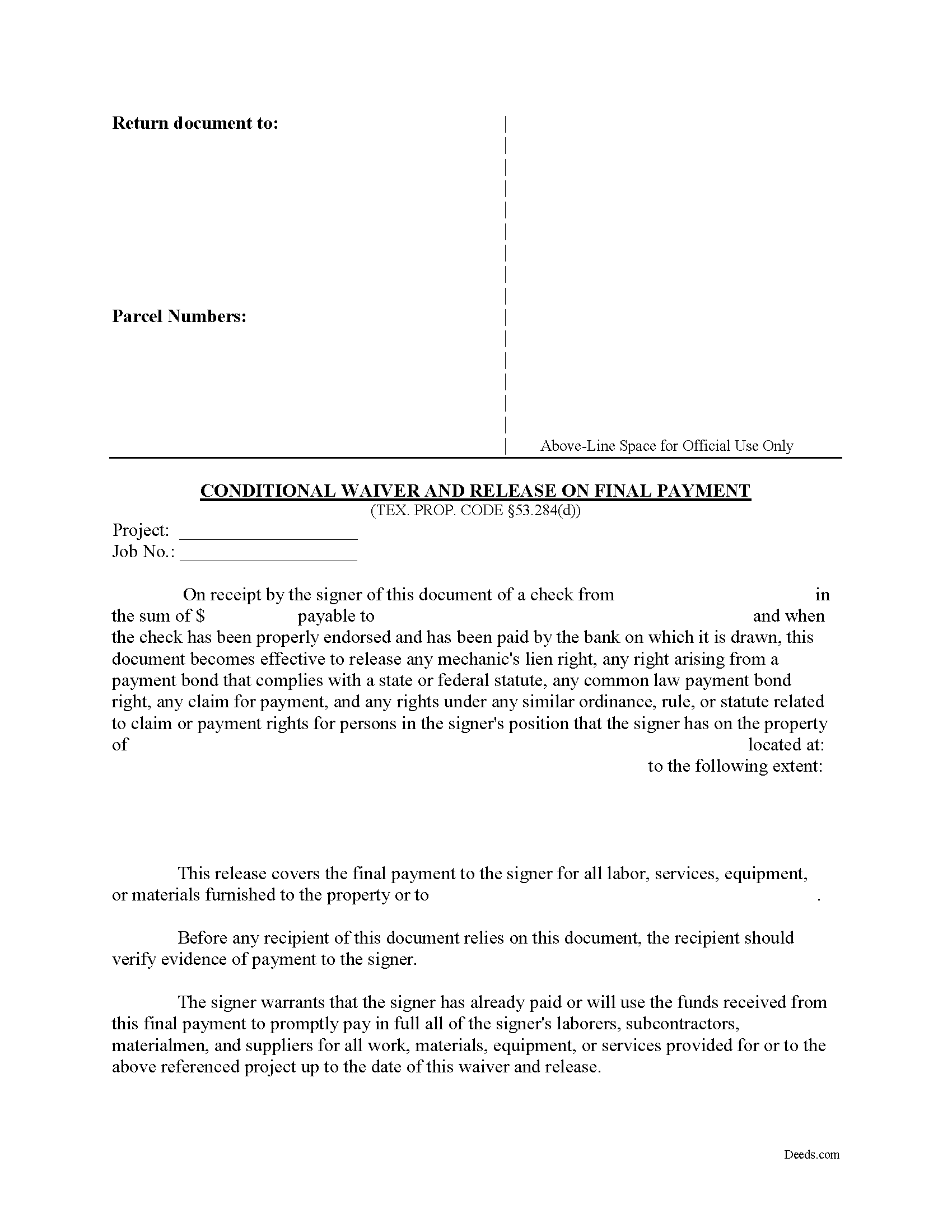
A lien waiver is used by a lien claimant or potential claimant to forfeit his or her right to a lien upon a progress payment or final payment. The waiver can be conditional, meaning that the payment must clear the bank before the lien is released, or unconditional, meaning the lien is released upon the recording of the waiver regardless of whether or not the claimant is ever actually paid.
A waiver and release given by a claimant or potential claimant is unenforceable unless it substantially complies with the applicable form described in Sec. 53.284 of the Texas Property Code.
The four types of lien waivers in the State of Texas include:
- Conditional Waiver and Release on Progress Payment;
- Unconditional Waiver and Release on Progress Payment;
- Conditional Waiver and Release on Final Payment; and
- Unconditional Waiver and Release on Final Payment
Let's say a contractor finishes work on a project where she recorded a lien. The owner wants the lien released, and writes a check for the full amount of the balance due. The contractor offers a conditional waiver and release on final payment, which protects her interests in case the bank refuses to hono... More Information about the Texas Conditional Waiver and Release on Final Payment
Unconditional Waiver on Progress Payment
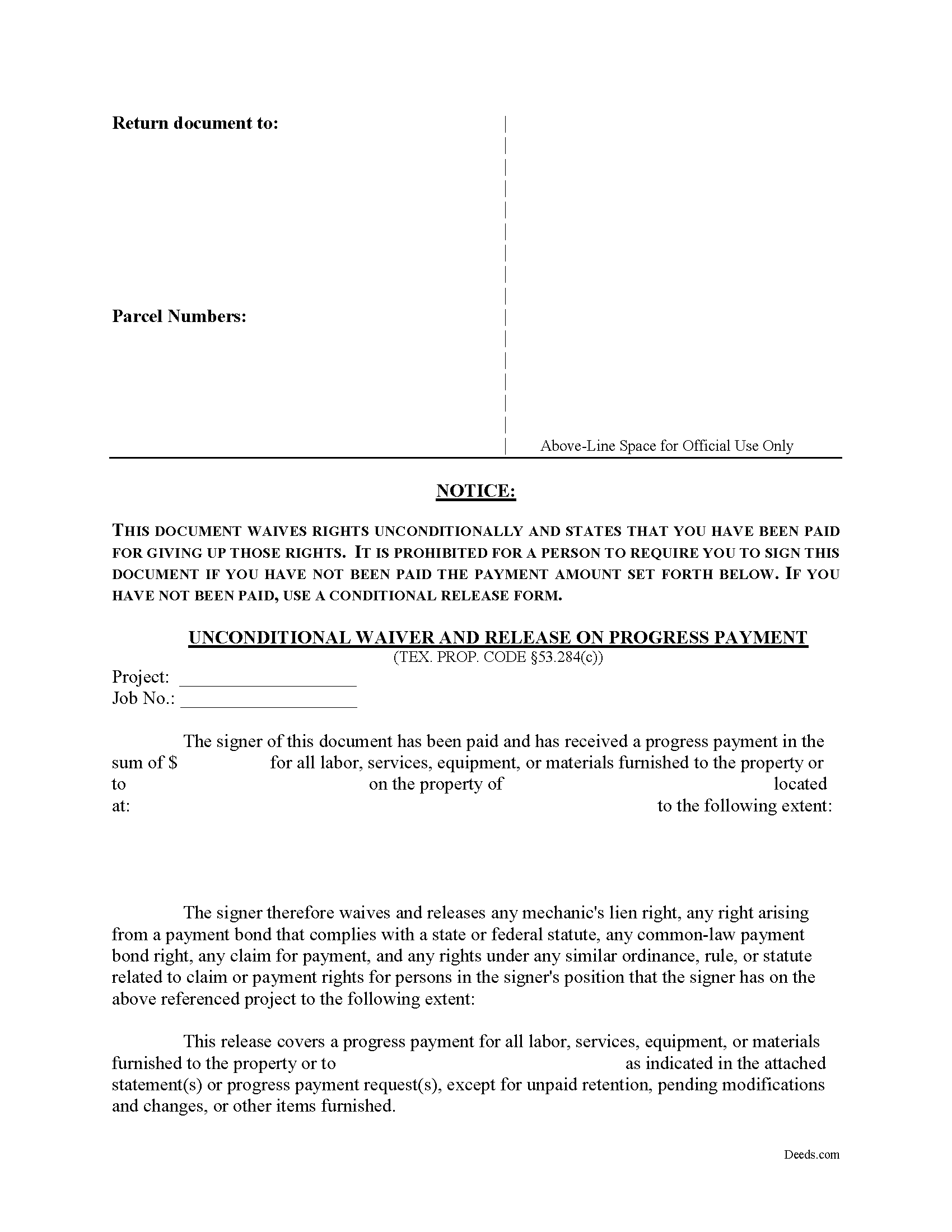
A lien waiver is used by a lien claimant or potential claimant to forfeit his or her right to a lien upon a progress payment or final payment. The waiver can be conditional, meaning that the payment must clear the bank before the lien is released, or unconditional, meaning the lien is released upon the recording of the waiver regardless of whether or not the claimant is ever actually paid.
A waiver and release given by a claimant or potential claimant is unenforceable unless it substantially complies with the applicable form described in Sec. 53.284 of the Texas Property Code.
The four types of lien waivers in the State of Texas include:
- Conditional Waiver and Release on Progress Payment;
- Unconditional Waiver and Release on Progress Payment;
- Conditional Waiver and Release on Final Payment; and
- Unconditional Waiver and Release on Final Payment
Let's say a contractor reaches an agreed-upon point a project where she recorded a lien. The owner wants the lien released up to that point, and writes a check for the amount due on the work completed. The contractor offers an unconditional waiver and release on progress payment, which protects her inter... More Information about the Texas Unconditional Waiver on Progress Payment
Unconditional Waiver on Final Payment
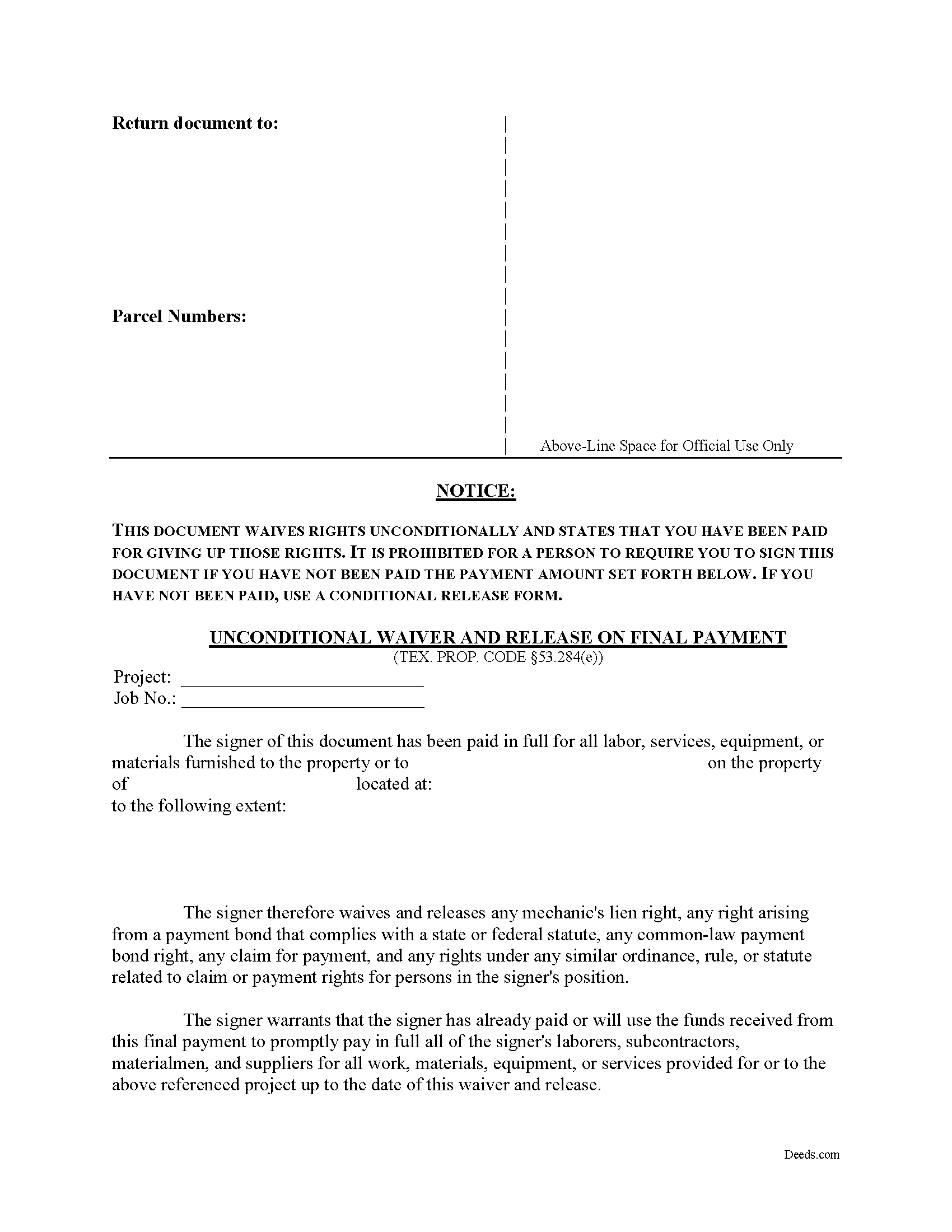
A lien waiver is used by a lien claimant or potential claimant to forfeit his or her right to a lien upon a progress payment or final payment. The waiver can be conditional, meaning that the payment must clear the bank before the lien is released, or unconditional, meaning the lien is released upon the recording of the waiver regardless of whether or not the claimant is ever actually paid.
A waiver and release given by a claimant or potential claimant is unenforceable unless it substantially complies with the applicable form described in Sec. 53.284 of the Texas Property Code.
The four types of lien waivers in the State of Texas include:
- Conditional Waiver and Release on Progress Payment;
- Unconditional Waiver and Release on Progress Payment;
- Conditional Waiver and Release on Final Payment; and
- Unconditional Waiver and Release on Final Payment
Let's say a contractor completes work a project where she recorded a lien. The owner wants the lien released and writes a check for the total amount due. If the contractor offers an unconditional waiver and release on final payment, she gives up her right to lien, even if the bank refuses to honor the ch... More Information about the Texas Unconditional Waiver on Final Payment
Release of Lien
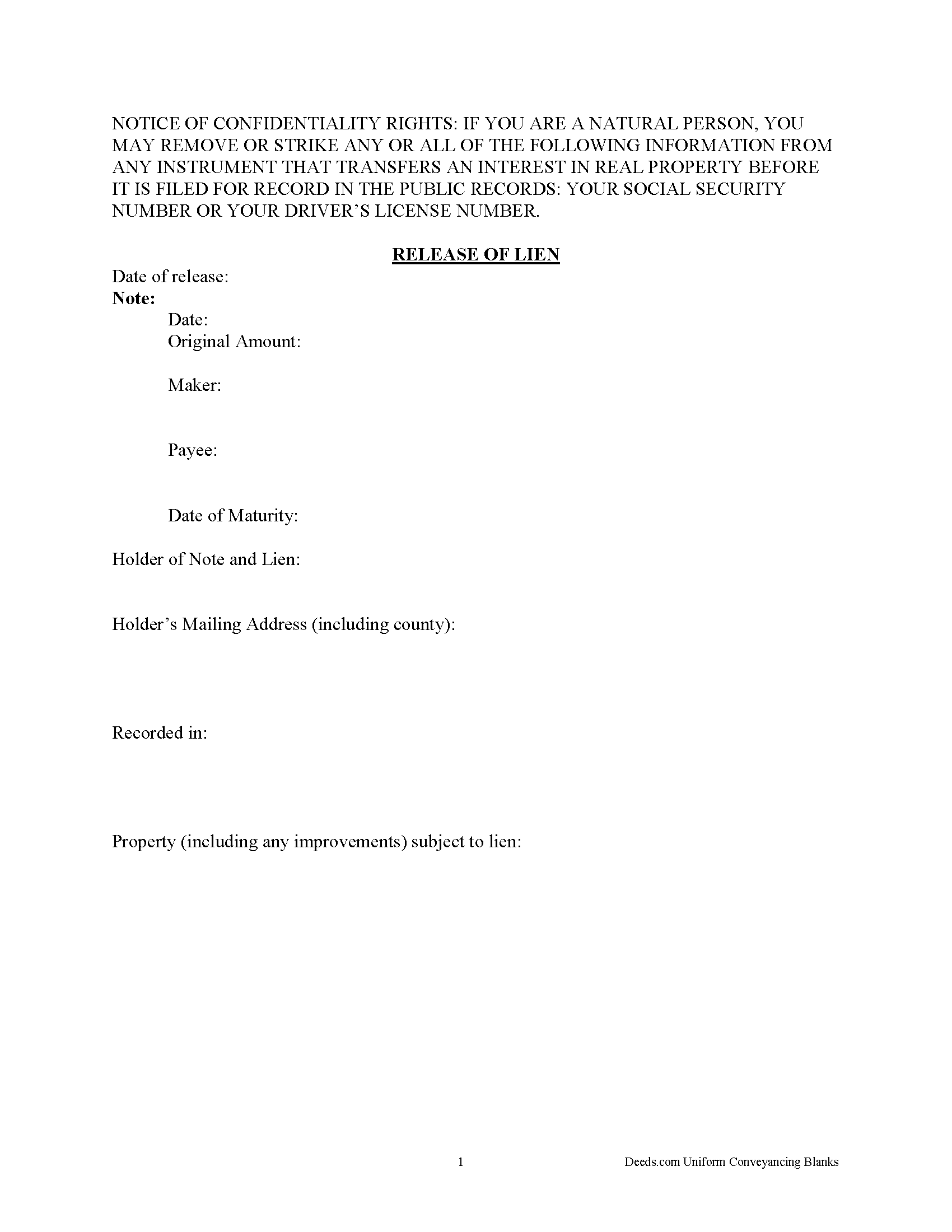
After completing payments on the promissory note connected to a deed of trust, the lender completes this release of lien form. Promptly recording this document in the same county as the original deed of trust and promissory note serves to unencumber (free up) the title to the related real property. There is no need for any words of conveyance because the property rights were transferred when the borrower and lender signed the deed of trust.... More Information about the Texas Release of Lien
Contract for Deed
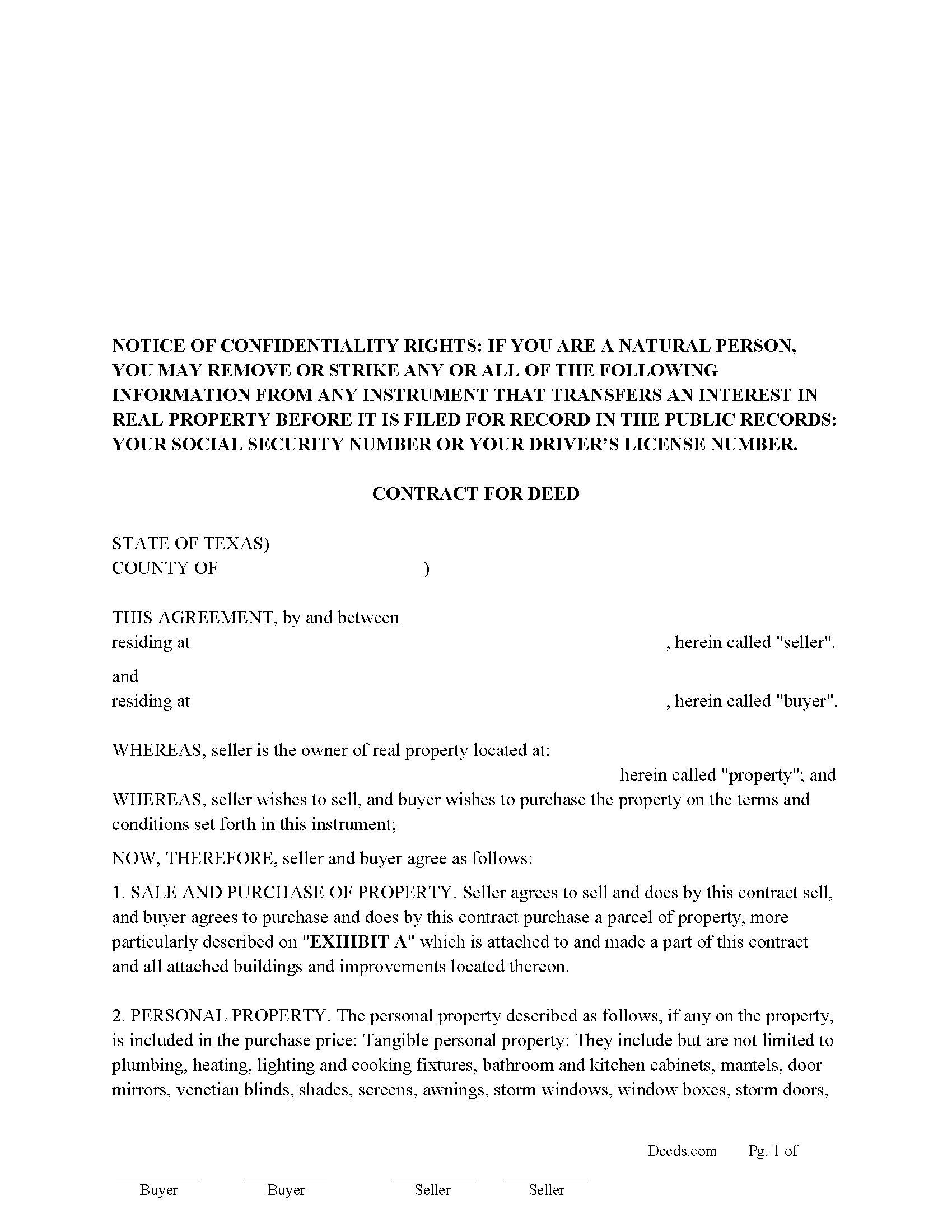
Contract for Deed also known as a Land Contract
Use for Seller financing of a home, condominium, rental property (up to 4 units), planned unit development, and land.
Financing can be conventional installment payments or installments followed by a balloon payment. This is often used with owner financing. 3 years of payments followed by a balloon payment. This gives the buyer time to build equity and credit. Buyer has the right to prepay any additional sums to reduce the principal at any time without penalty.
This form includes the following as per [Texas Code 5.071-Seller's Disclosure of Financing Terms]
[(1) the purchase price of the property;
(2) the interest rate charged under the contract;
(3) the dollar amount, or an estimate of the dollar amount if the interest rate is variable, of the interest charged for the term of the contract;
(4) the total amount of principal and interest to be paid under the contract;
(5) the late charge, if any, that may be assessed under the contract; and
(6) the fact that the seller may not charge a prepayment penalty or any similar fee if the purchaser elects to pay the entire amount due under the contract before the scheduled payment dat... More Information about the Texas Contract for Deed
Memorandum of Contract
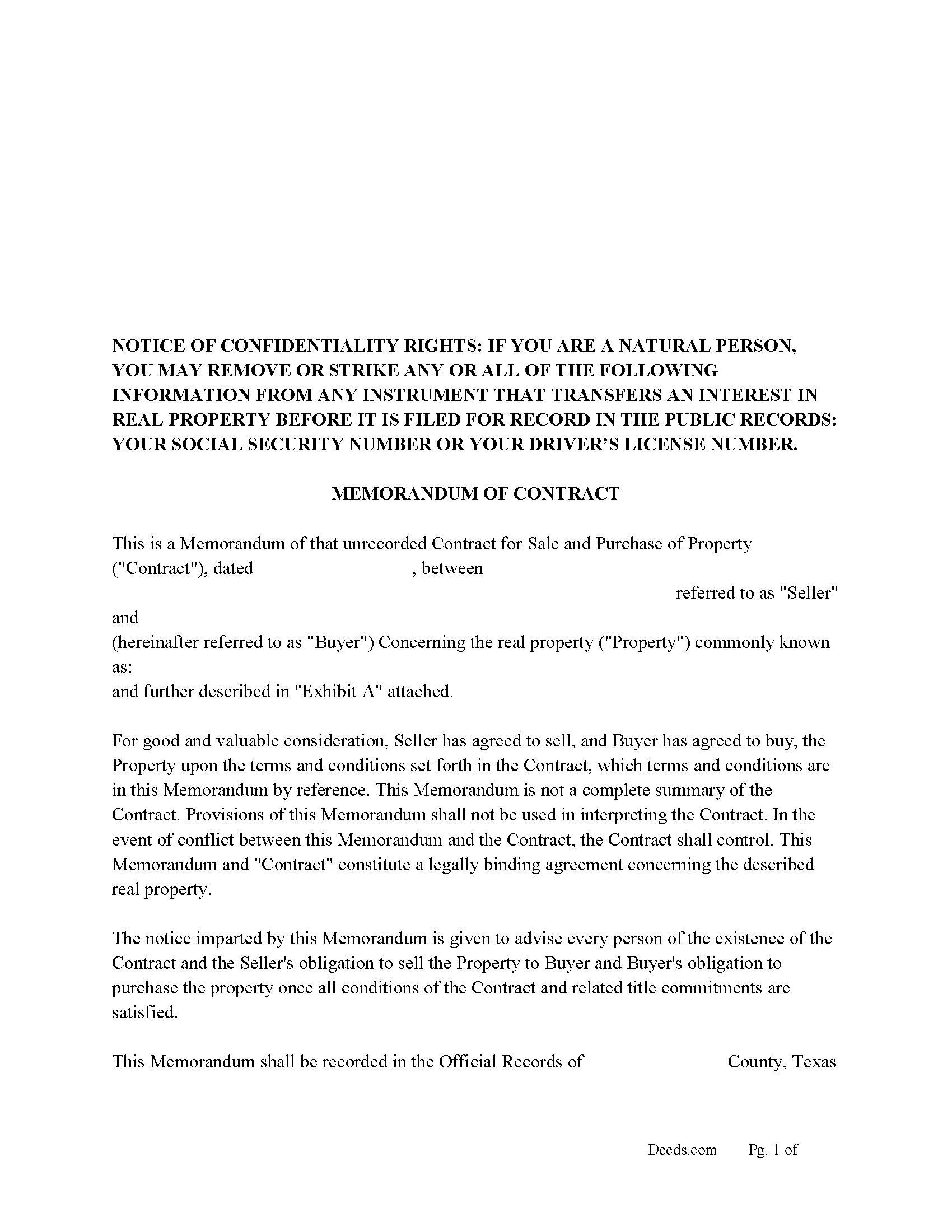
When is this document used?
When a property is sold, and a Contract has been executed by both parties this Memorandum document is often recorded in the county where the subject property is located instead of the actual Contract. Stating - Seller has agreed to sell, and Buyer has agreed to buy, the Property upon the terms and conditions set forth in the Contract.
Why a Memorandum of Contract?
Privacy - When parties want to keep financial details of a Contract for Deed, Land Contract or Buy-Sell Agreement private, a Memorandum is recorded.
Notice - puts the world on notice that a Contract between buyer and seller exists on a specific property.
Legal - legal binding agreement between buyer and seller concerning the property in question.
Protection - Often filed by buyers alone, after a contract has been executed, preventing loans or encumbrances being placed on the property by existing Deed holder. Encumbrances have been placed on properties even though the Contract states they can't. This can be devastating for a buyer who has made payments. A Memorandum is an effective instrument to prevent this. In short, either the Contract or Memorandum should be recorded for ... More Information about the Texas Memorandum of Contract
Deed of Trust and Promissory Note
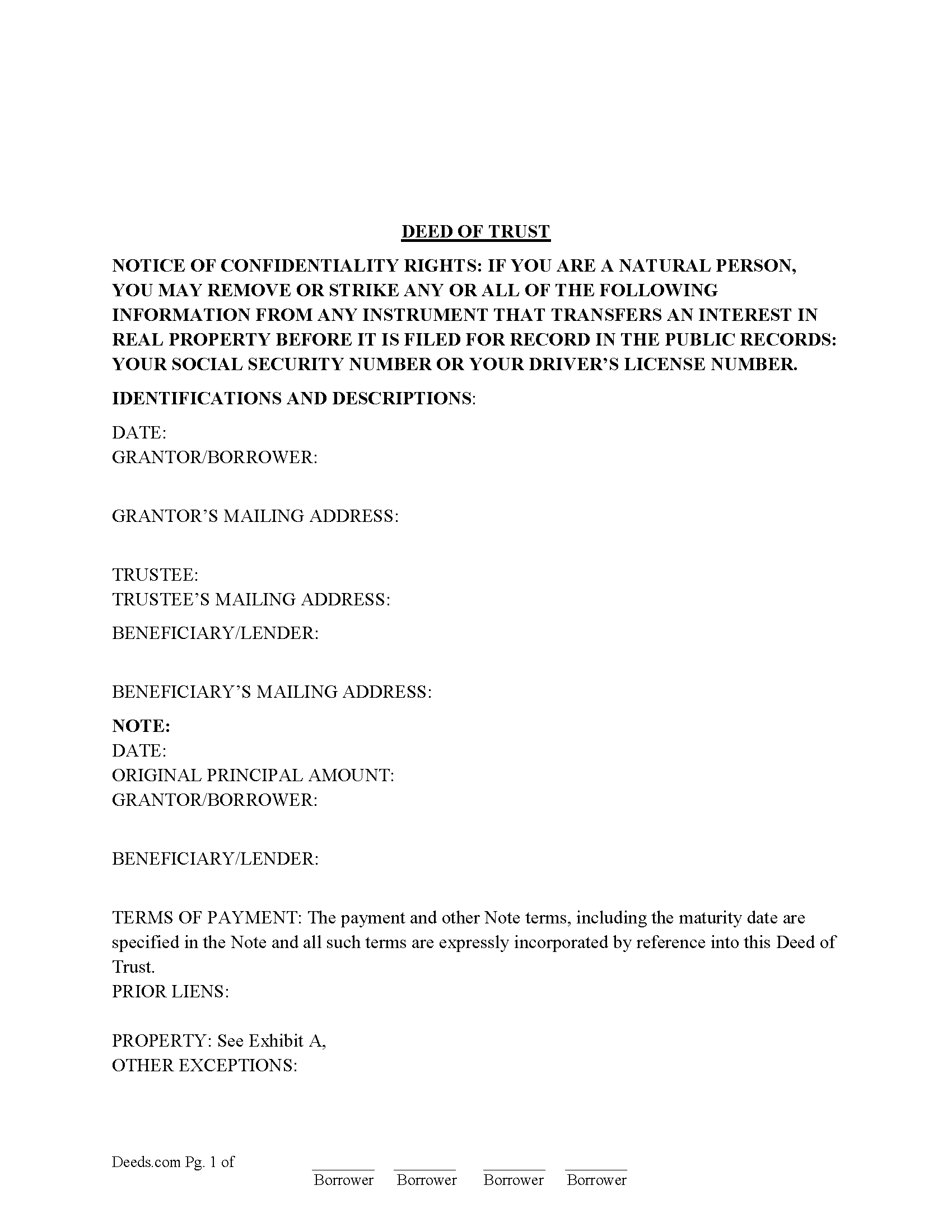
A deed of trust (DOT) is a document that conveys title to real property to a trustee as security for a loan until the grantor (borrower) repays the lender according to terms defined in a promissory note. It's similar to a mortgage but differs - mortgages only include two parties (borrower and lender). In Texas a Deed of Trust is the preferred lending instrument.
There are three parties to a deed of trust: the borrower (grantor), the lender (beneficiary), and the trustee. The trustee, typically a title agency or other disinterested party, serves two purposes: to initiate the foreclosure process for the lender if the borrower defaults on the loan, and to transfer (reconvey) the property back to the borrower after the debt is paid in full.
This DOT includes a power of sale clause, this can be beneficial to the lender, saving time and expense in the case of a foreclosure. Sec.51.0074. DUTIES OF TRUSTEE.
(a) One or more persons may be authorized to exercise ... More Information about the Texas Deed of Trust and Promissory Note
Release of Lien - by Deed of Trust and Note
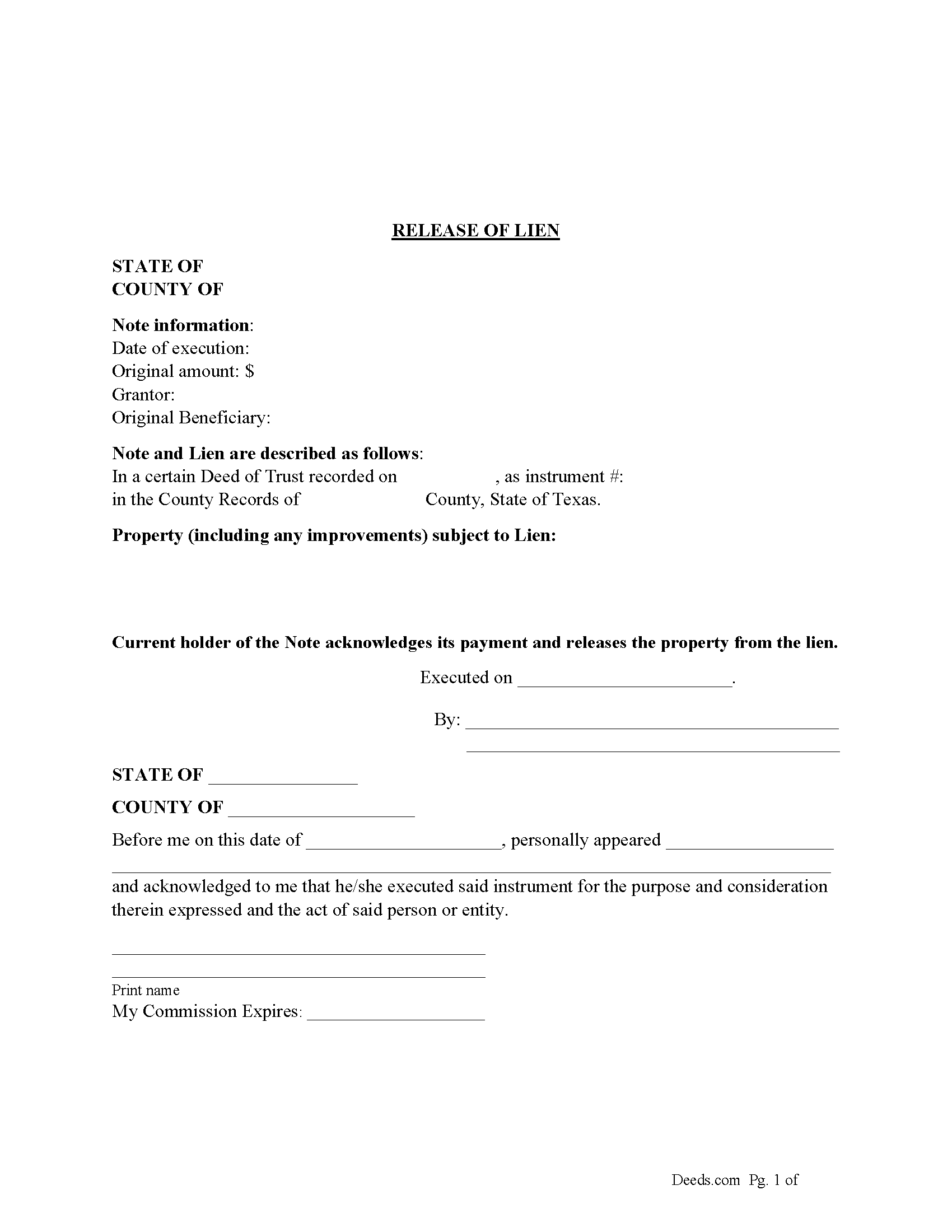
This form used to release a lien placed on real property by a previously recorded Deed of Trust. The current holder/lender or representative signs the Release of Lien document, acknowledging payment and release of the lien.
(Texas Release of Lien Package includes form, guidelines, and completed example) For use in Texas only.
... More Information about the Texas Release of Lien - by Deed of Trust and Note
Appointment of Substitute Trustee for Deed of Trust
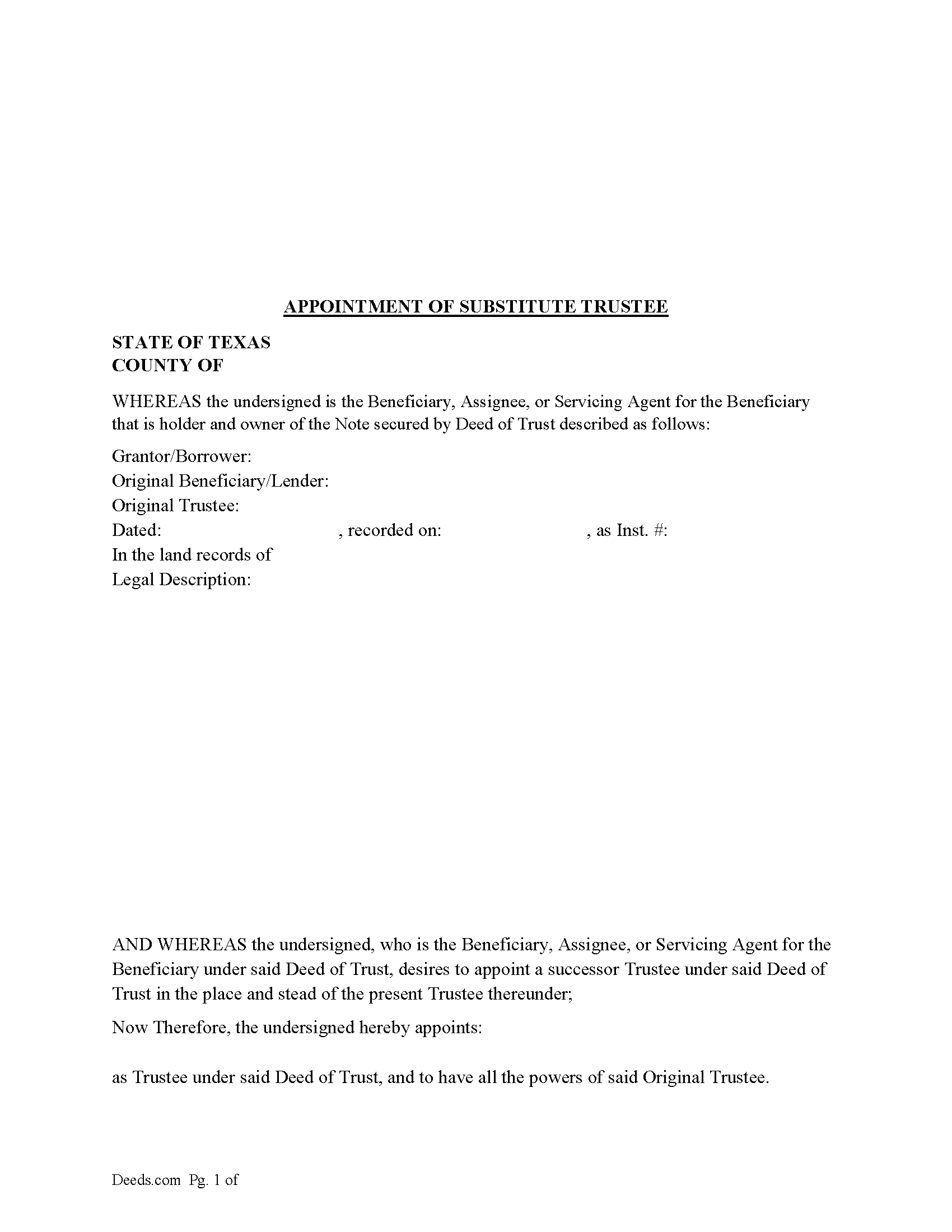
This form is used to substitute a trustee in a Deed of Trust Document. This is frequently done when the Deed of Trust is in default and the current trustee can't or won't act. This document is executed by the Beneficiary/lender, assignee, representative, attorney or mortgage servicer.
"Substitute trustee" means a person appointed by the current mortgagee or mortgage servicer under the terms of the security instrument to exercise the power of sale. Sec. 51.0001.(7)
Sec. 51.0075. AUTHORITY OF TRUSTEE OR SUBSTITUTE TRUSTEE.
(a) A trustee or substitute trustee may set reasonable conditions for conducting the public sale if the conditions are announced before bidding is opened for the first sale of the day held by the trustee or substitute trustee.
(b) A trustee or substitute trustee is not a debt collector.
(c) Notwithstanding any agreement to the contrary, a mortgagee may appoint or may authorize a mortgage servicer to appoint a substitute trustee or substitute trustees to succeed to all title, powers, and duties of the original trustee. A mortgagee or mortgage servicer may make an appointment or authorization under this subsection by power of attorney, corpora... More Information about the Texas Appointment of Substitute Trustee for Deed of Trust
Assignment of Deed of Trust
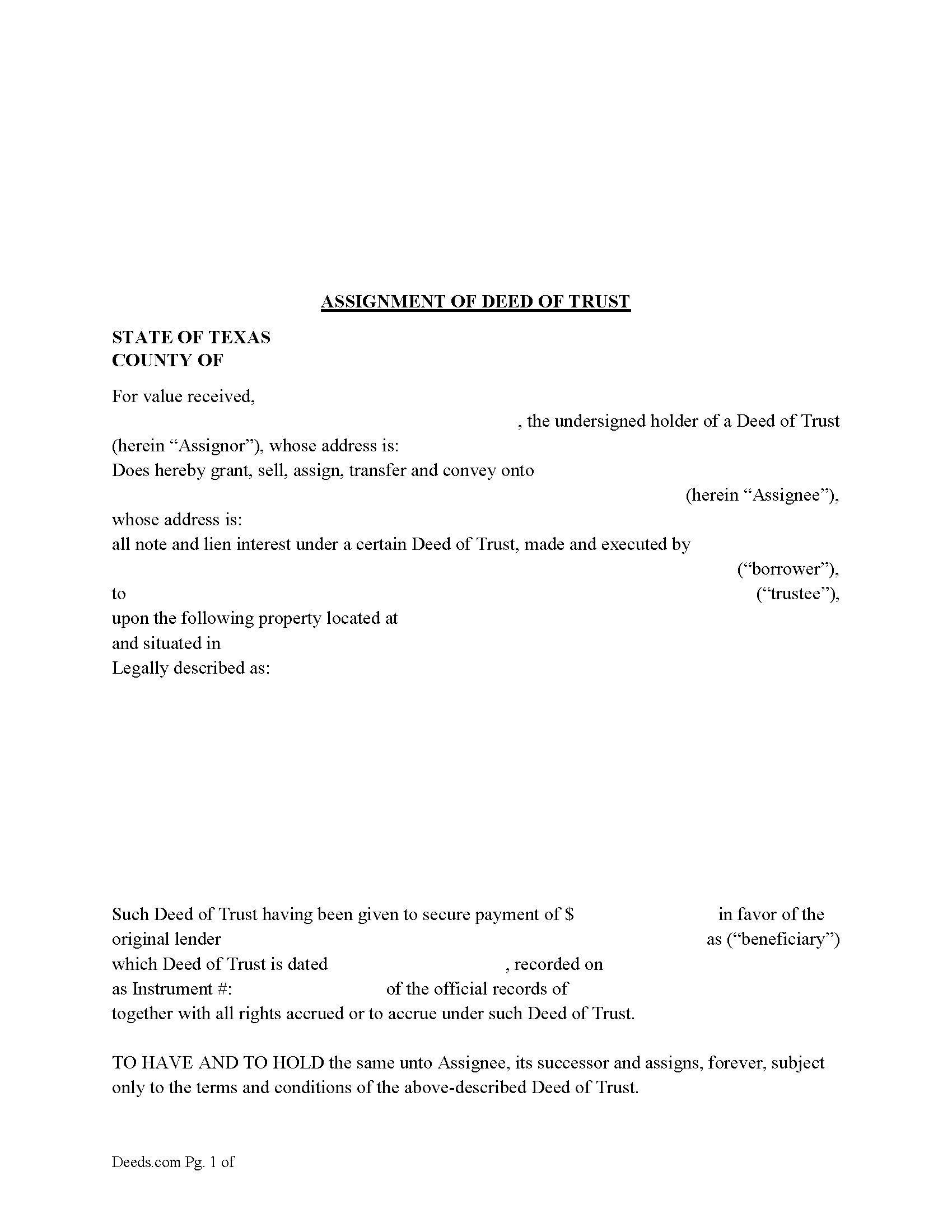
This form is used by the current holder/lender or representative to assign a recorded Deed of Trust and Promissory Note to another entity. This is common when a Deed of Trust has been sold.
(Texas Assignment of Deed of Trust Package includes form, guidelines, and completed example) For use in Texas only.
... More Information about the Texas Assignment of Deed of Trust
Collateral Assignment of Note and Liens (Security Agreement)
.png)
1. Borrower/Obligor 2. Debtor/Original Lender 3. Secured Party(SP)/3rd Party/New Lender
This form assigns the current Debtors/lenders security interest in a promissory note backed by a previously recorded Deed of Trust Lien, with all rights, titles, equities and interest securing the same as described in that certain Deed of Trust. This collateral is assigned to a Secured Party to protect a Security Agreement made between the Debtor and Secured Party. A collateral assignment is a pledge that the Debtor will pay the Secured Party as agreed. Debtor authorizes Secured Party, at Secured Party's option, to collect any and all sums becoming due upon the Collateral, such sums to be held by Secured Party without liability for interest thereon and applied toward the payment of the Obligations as and when the same becomes payable, and Secured Party shall have the full control of the Collateral and the Deed of Trust Lien securing t... More Information about the Texas Collateral Assignment of Note and Liens (Security Agreement)
Release of Collateral Transfer of Note and Lien
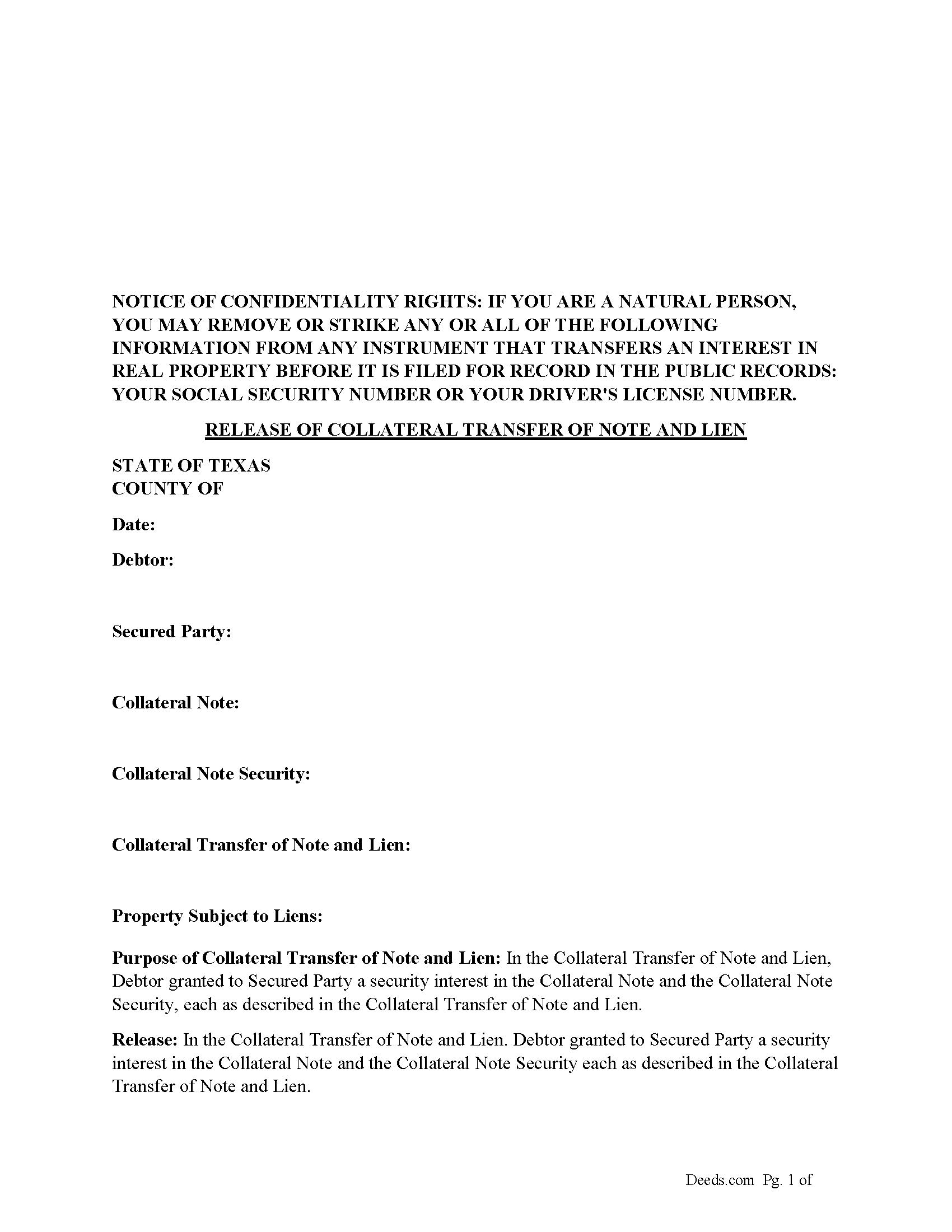
This form is used by the secured party to release a collateral interest in a property, that was previously assigned and recorded with a "Collateral Transfer of Note and Lien" document, in which Debtor granted to Secured Party a security interest in the Collateral Note and the Collateral Note Security (typically a Deed of Trust), each as described in the Collateral Transfer of Note and Lien.
For use in Texas only.
... More Information about the Texas Release of Collateral Transfer of Note and Lien
Collateral Assignment of Leases, Rents and Rights
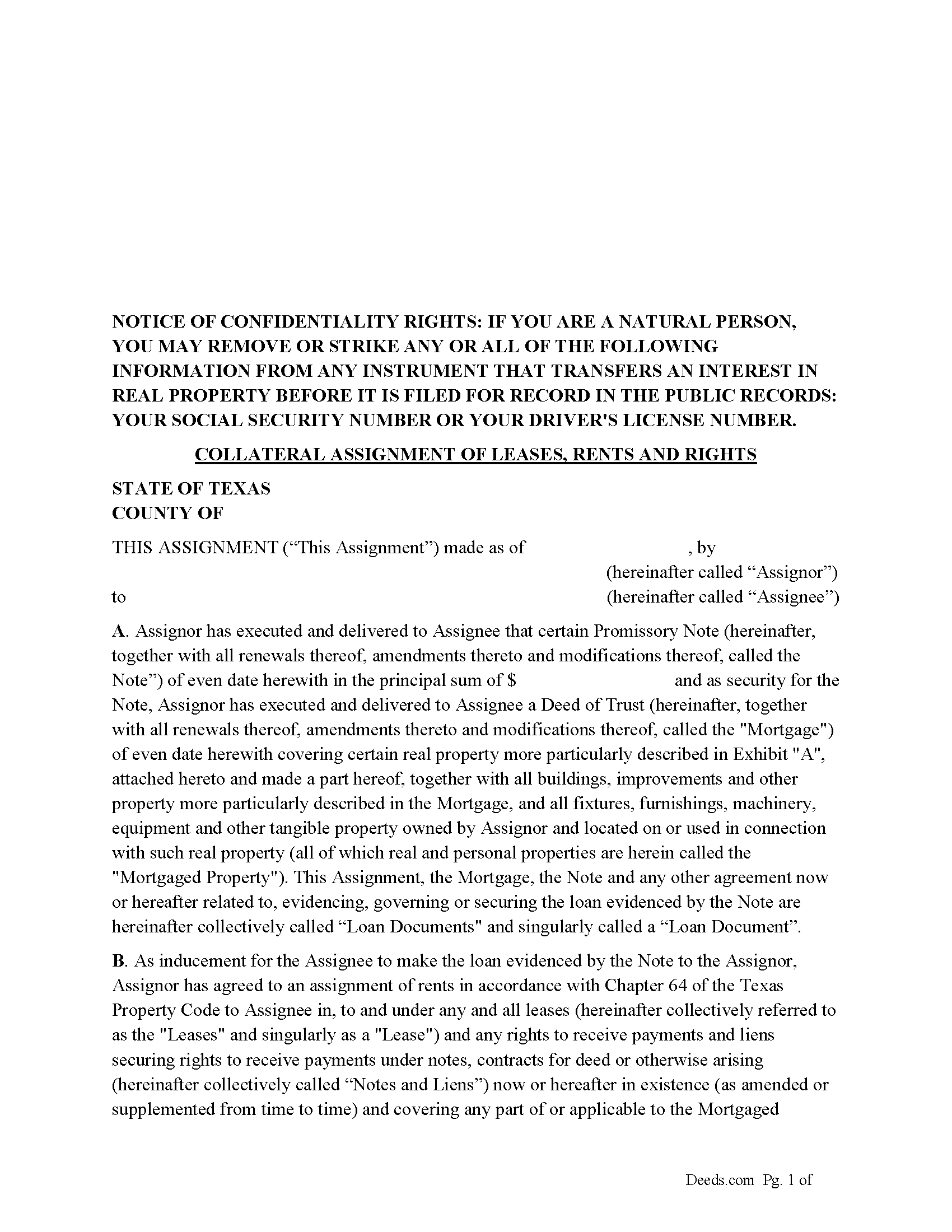
This form is executed/signed by the borrower/Assignor as inducement for the Lender/Assignee to make the loan evidenced by a Note secured by a Deed of Trust, borrower/Assignor has agreed to an assignment of rents in accordance with Chapter 64 of the Texas Property Code to Lender/Assignee in, to and under any and all leases (hereinafter collectively referred to as the "Leases" and singularly as a "Lease") and any rights to receive payments and liens securing rights to receive payments under notes, contracts for deed or otherwise arising (hereinafter collectively called "Notes and Liens")
Sec. 64.053. ENFORCEMENT OF SECURITY INTEREST IN RENTS GENERALLY.
(a) An assignee may enforce an assignment of rents using one or more of the methods provided by Section 64.054 or 64.055 or any other method sufficient to enforce an assignment of rents under a law of this state other than this chapter.
(b) On and after the date on which an assignee begins to enforce an assignment of rents, the assignee is entitled to collect all rents that:
(1) have accrued but remain unpaid on that date; and
(2) accrue on or after that date.
For use in Texas only.... More Information about the Texas Collateral Assignment of Leases, Rents and Rights
Release of Collateral Assignment of Leases and Rents
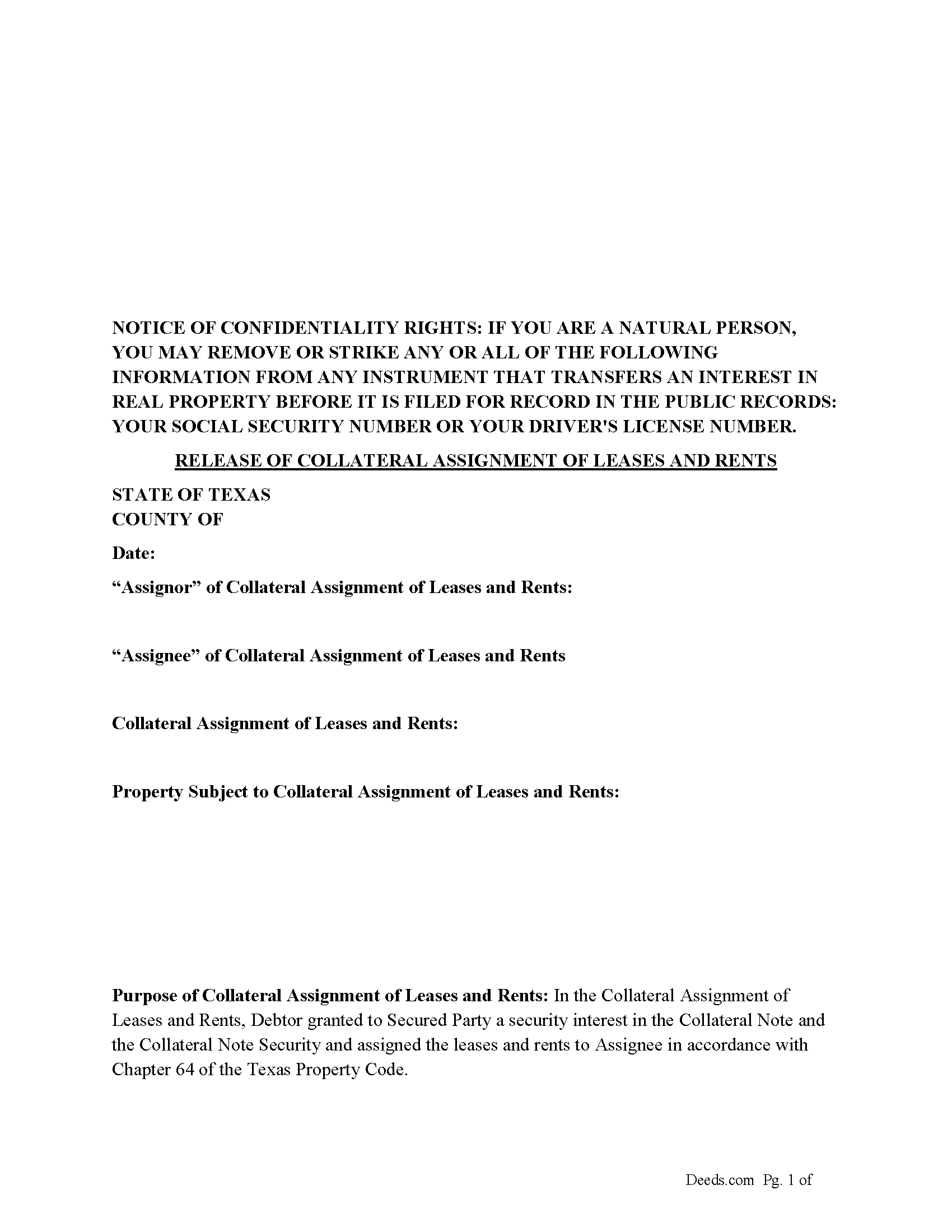
Use this form to release a previously recorded "Collateral Assignment of Leases and Rents", when the debt secured by the "Collateral Assignment of Lease and Rents" is satisfied.
For use in Texas only.
... More Information about the Texas Release of Collateral Assignment of Leases and Rents
Lis Pendens
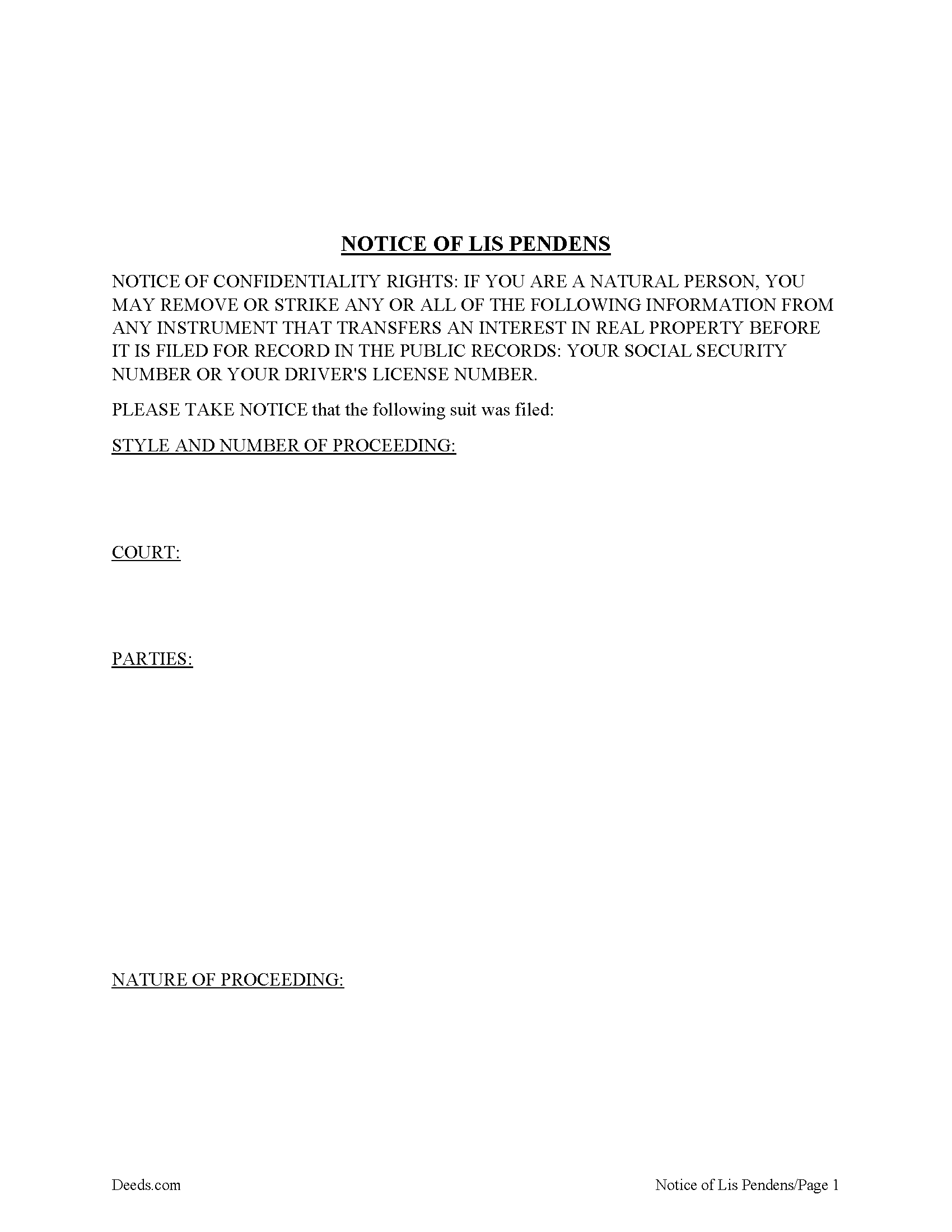
A lis pendens is filed in the county where the property is located. This is done after litigation affecting title to real property is taken. Requirement for filing a lis pendens in Texas are codified in Tex. Prop. Code 12.007. Texas court cases have laid the foundation, that the person filing the lis pendens must have a direct interest in the ownership of the real property and not simply a collateral interest to recover monetary damages. Although a lis pendens is not a lien, it is often viewed in a similar light and can therefore have the effect of stopping a sale. Why? Because constructive notice of litigation has now been given to potential buyers.
When a Lis Pendens document is filed it must contain a proof of service which is an acknowledgment of service by the person served or a certificate of service. In some cases, the clerk will permit a document to be filed but will require the proof of service to be filed promptly thereafter. 9.5(d)
9.5(e) Certificate Requirements. A certificate of service must be signed by the person who made the service and must state: ... More Information about the Texas Lis Pendens
Lis Pendens Release
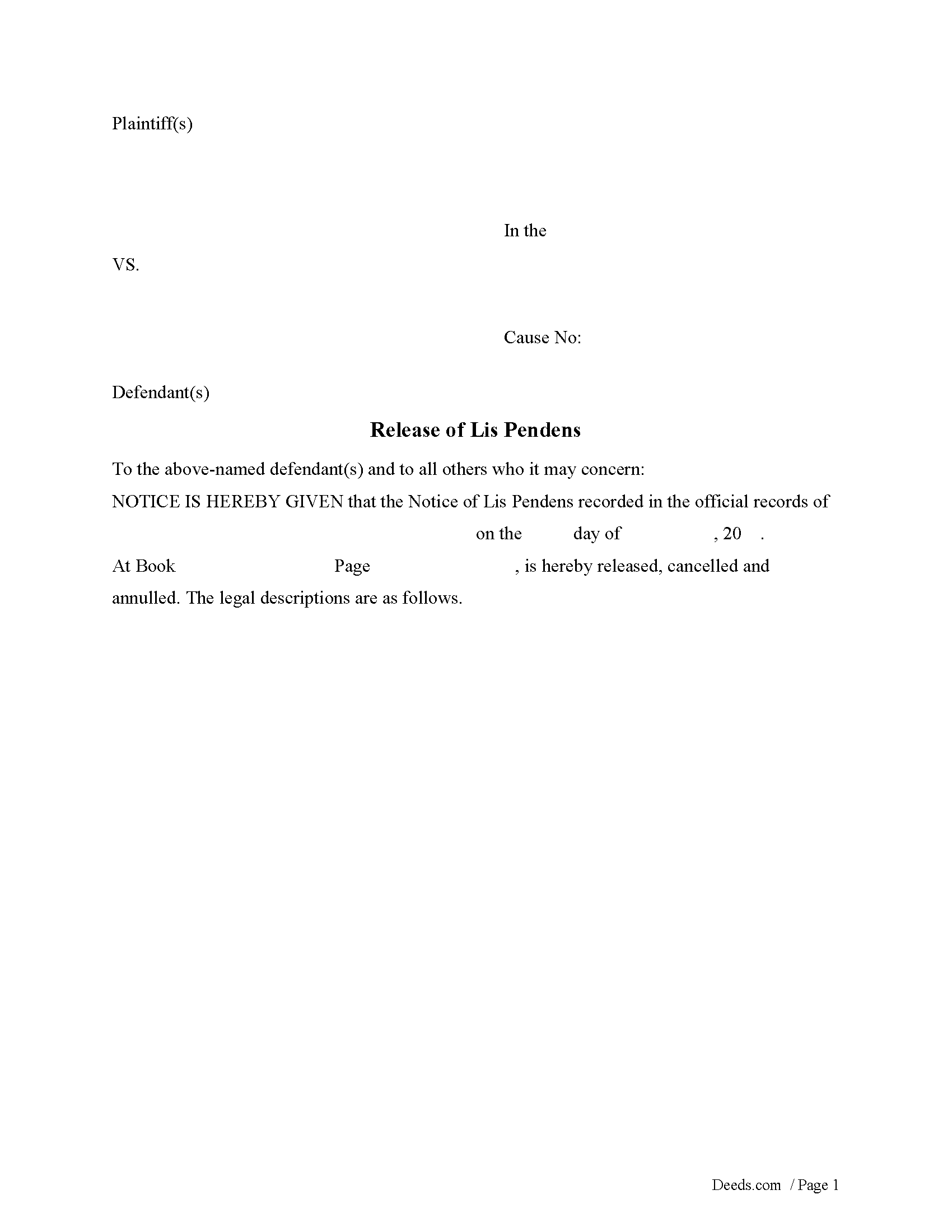
Lis pendens are like property liens, and they can make properties unmarketable or non-saleable until they're removed. Notices of voluntary dismissal and release of lis pendens declarations are issued frequently when lawsuits are dismissed.
When a Release of Lis Pendens document is filed it must contain a proof of service which is an acknowledgment of service by the person served or a certificate of service. In some cases, the clerk will permit a document to be filed but will require the proof of service to be filed promptly thereafter. 9.5(d)... More Information about the Texas Lis Pendens Release